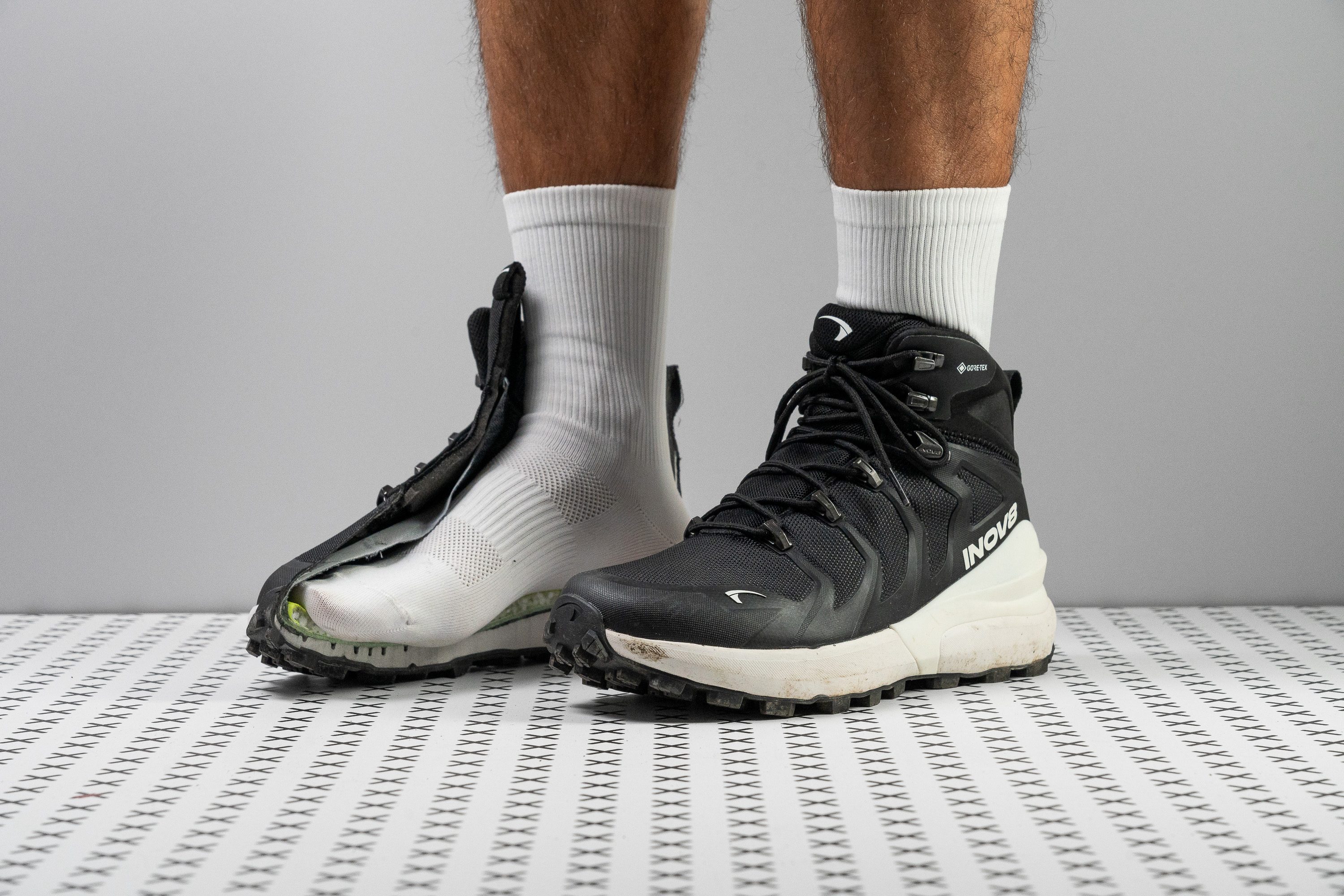Our verdict
- Top pick in best hiking boots for wide feet (2025)
Pros
- Great stability for backpacking
- Excellent underfoot protection (+ rock plate)
- Thick insole with energy return
- Very spacious toebox
- Light for a backpacking boot
- Superb grip with deep lugs
- Effective waterproofing
Cons
- Abrasion resistance could be better
- Gets notably stiffer in cold
Audience verdict
Comparison
The most similar hiking boots compared
+ + Add a shoe | |||||
|---|---|---|---|---|---|
| Audience score | 88 Great! | 90 Great! | 84 Good! | 84 Good! | |
| Price | $230 | $255 | $160 | $230 | |
| Trail terrain | ModerateTechnical | Technical | Moderate | Technical | |
| Shock absorption | - | Moderate | Low | Low | |
| Energy return | - | High | Moderate | Moderate | |
| Weight lab Weight brand | 18.3 oz / 519g | 21.1 oz / 597g 19.5 oz / 553g | 19.9 oz / 563g | 23.4 oz / 663g 23.1 oz / 655g | |
| Breathability | Warm | Warm | Warm | Warm | |
| Use | BackpackingDay HikingSnow | BackpackingDay HikingSnow | BackpackingDay HikingSnowBeginners | BackpackingDay HikingSnow | |
| Orthotic friendly | ✓ | ✓ | ✓ | ✓ | |
| Drop lab | 8.3 mm | 17.2 mm | 16.4 mm | 18.0 mm | |
| Size | Half size small | True to size | Slightly small | True to size | |
| Midsole softness | Balanced | Balanced | Firm | Balanced | |
| Difference in midsole softness in cold | Normal | Small | Small | Normal | |
| Heel counter stiffness | Stiff | Flexible | Stiff | Stiff | |
| Stiffness | Stiff | Moderate | Flexible | Stiff | |
| Outsole hardness | Average | Average | Average | Average | |
| Waterproofing | Waterproof | Waterproof | Waterproof | Waterproof | |
| Material | Textile | Leather | LeatherMesh | Textile | |
| Season | Winter | Winter | Winter | Winter | |
| Toebox durability | Bad | Good | Bad | Good | |
| Heel padding durability | Bad | Decent | Bad | Good | |
| Outsole durability | Bad | Decent | Decent | Decent | |
| Width / fit | Wide | Medium | Medium | Wide | |
| Toebox width | Wide | Narrow | Medium | Medium | |
| Lug depth | 5.3 mm | 5.1 mm | 4.6 mm | 4.7 mm | |
| Heel stack lab | 37.8 mm | 37.8 mm | 38.7 mm | 38.0 mm | |
| Forefoot | 29.5 mm | 20.6 mm | 22.3 mm | 20.0 mm | |
| Widths available | NormalWide | NarrowNormalWide | Normal | Normal | |
| Technology | Gore-Tex | Gore-TexVibram | - | Gore-TexOrtholite | |
| Cut | Mid cut | Mid cut | Mid cut | High cut | |
| Removable insole | ✓ | ✓ | ✓ | ✓ | |
| Ranking | #13 Top 32% | #7 Top 18% | #26 Bottom 36% | #25 Bottom 39% | |
| Popularity | #39 Bottom 4% | #16 Top 40% | #37 Bottom 9% | #9 Top 22% |
Who should buy
Definitely consider the Roclite Pro Mid GTX if you are looking for:
- a boot for multi-day backpacking objectives and challenging thru-hikes
- a supportive hiking boot that's fairly light
- an outsole with deep (5.3 mm) lugs for tackling muddy and soft terrain
- a spacious toebox for wide feet, thick socks, toe swelling, bunions, etc.
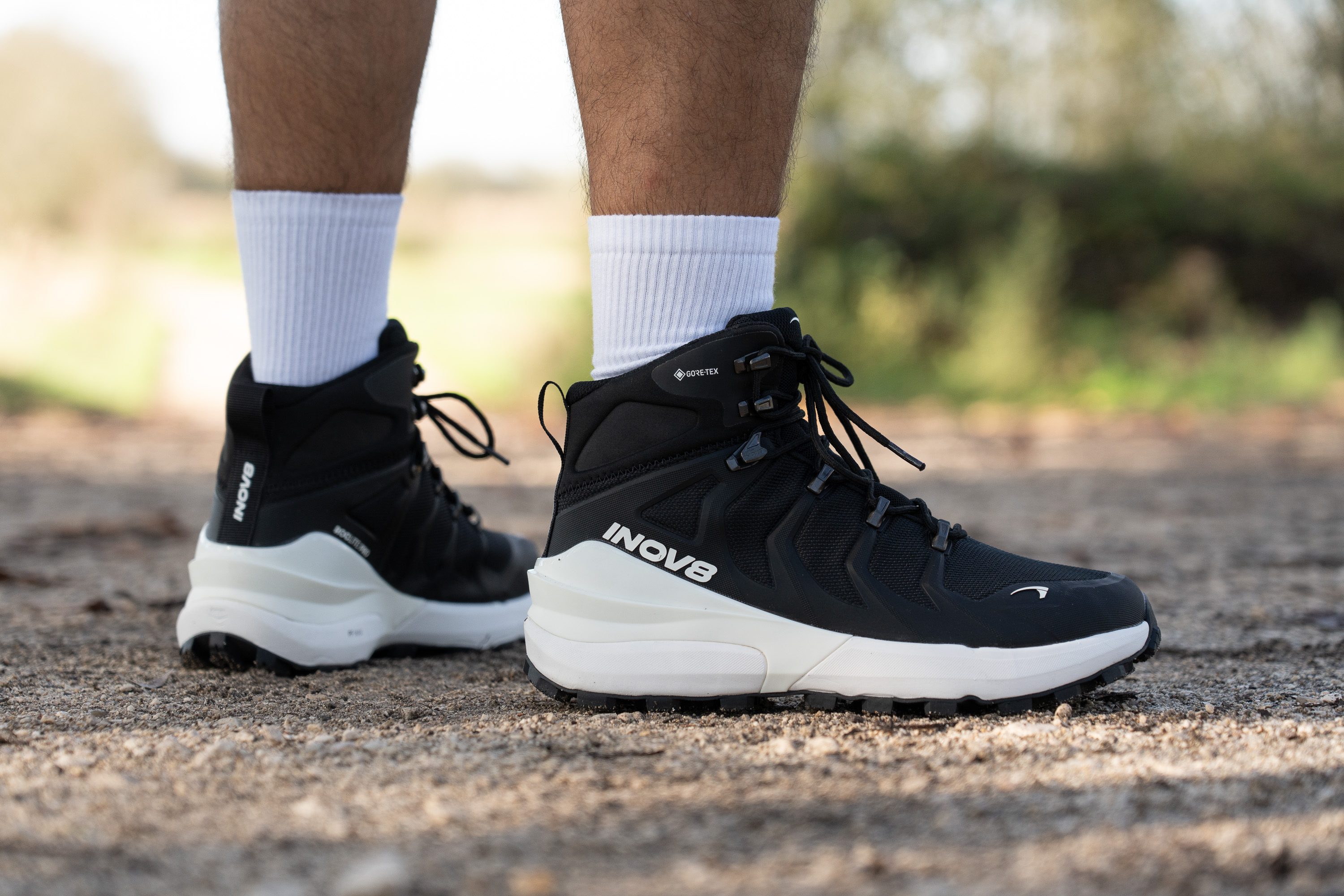
Who should NOT buy
We wouldn't say that its durability is poor, but it is a bit of a weak spot for the Roclite Pro Mid GTX. If you don't mind trading some of its lightness for enhanced wear resistance, look into the Scarpa Rush TRK GTX or the Scarpa Boreas GTX.
And if you don't need a full-on backpacking boot, Inov8 also offers a step-down version for day hikes, the Roclite Mid GTX (without "Pro"), and the low-cut hiking shoe, the Roclite GTX.
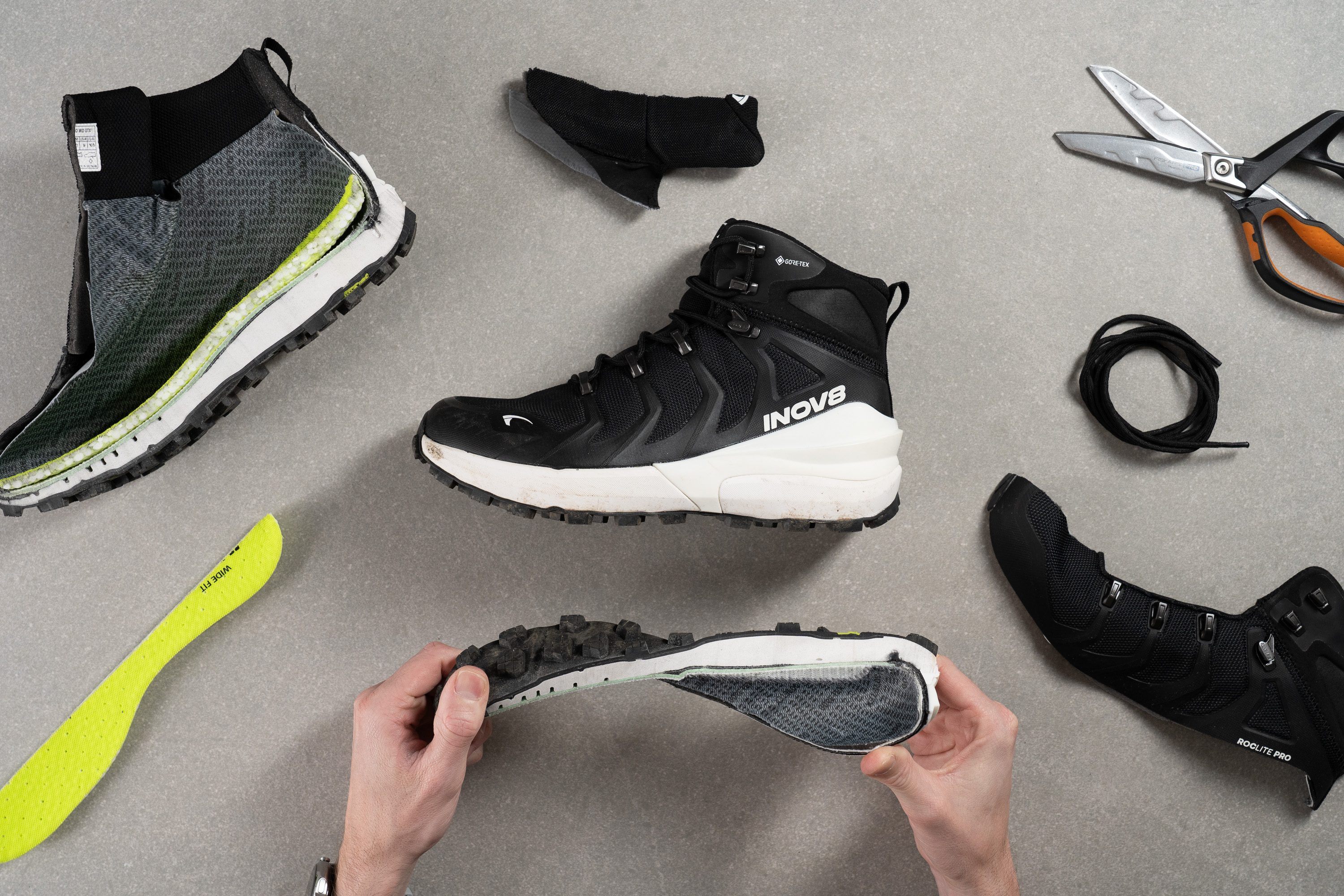
Cushioning
Heel stack
With a caliper reading of 37.8 mm, we found that the Inov8 Roclite Pro Mid GTX has a solid heel stack for a multi-day backpacking boot. It is right on par with the category average.
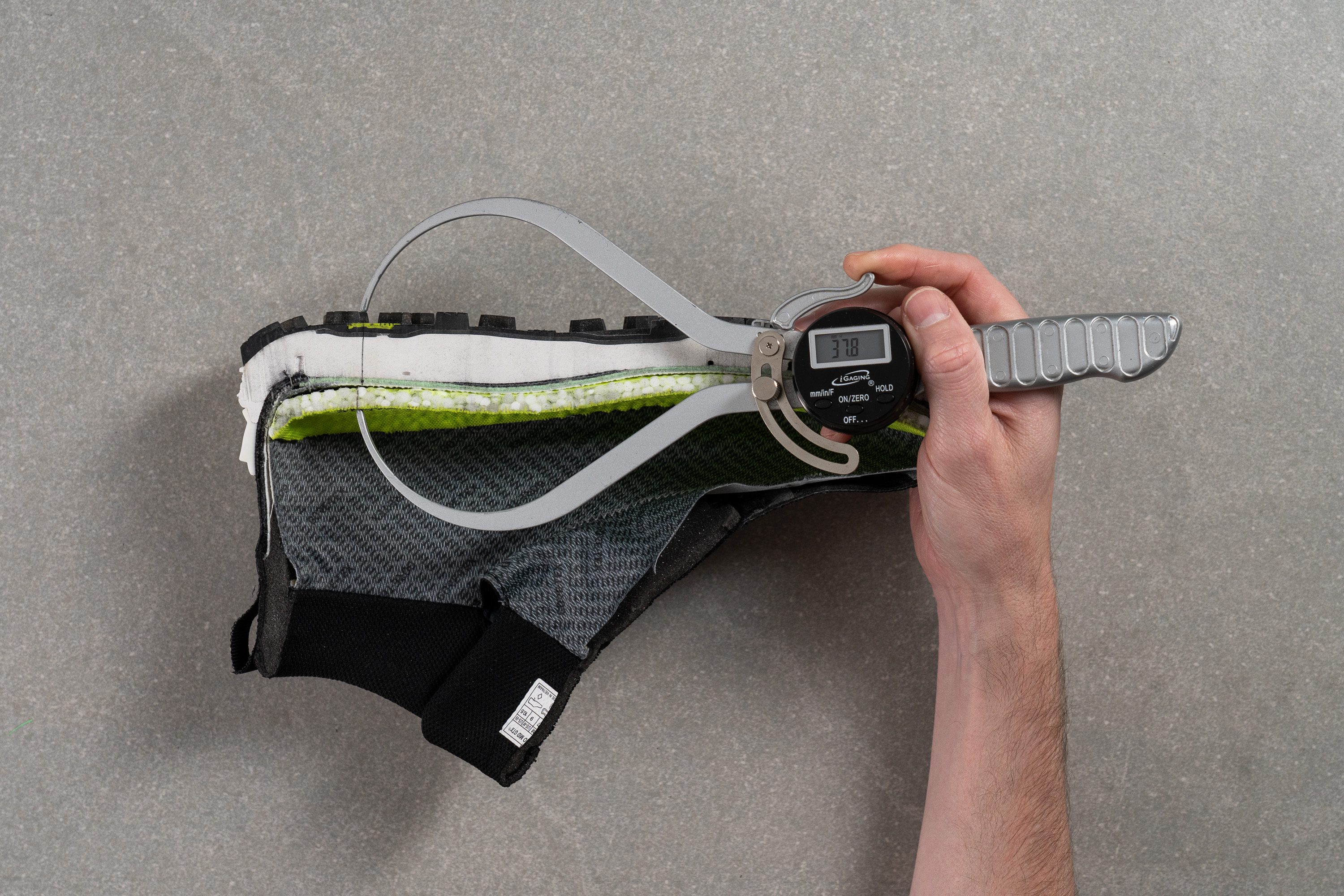
It made us feel fully prepared for a long haul because, in addition to the primary cushioning, Inov8 also packed a generously padded insole and a protective rock plate into the stack. Together, these elements maxed out the Roclite's impact protection on rocky terrain.
On the other hand, this boot didn't feel as disconnected from the trail as some of the more massive backpacking options.
| Roclite Pro Mid GTX | 37.8 mm |
| Average | 36.3 mm |
Forefoot stack
The Roclite's underfoot support was even more apparent under the balls of our feet, showing an above-average forefoot stack of 29.5 mm. It made us feel particularly surefooted on the ascents full of rocks and roots.
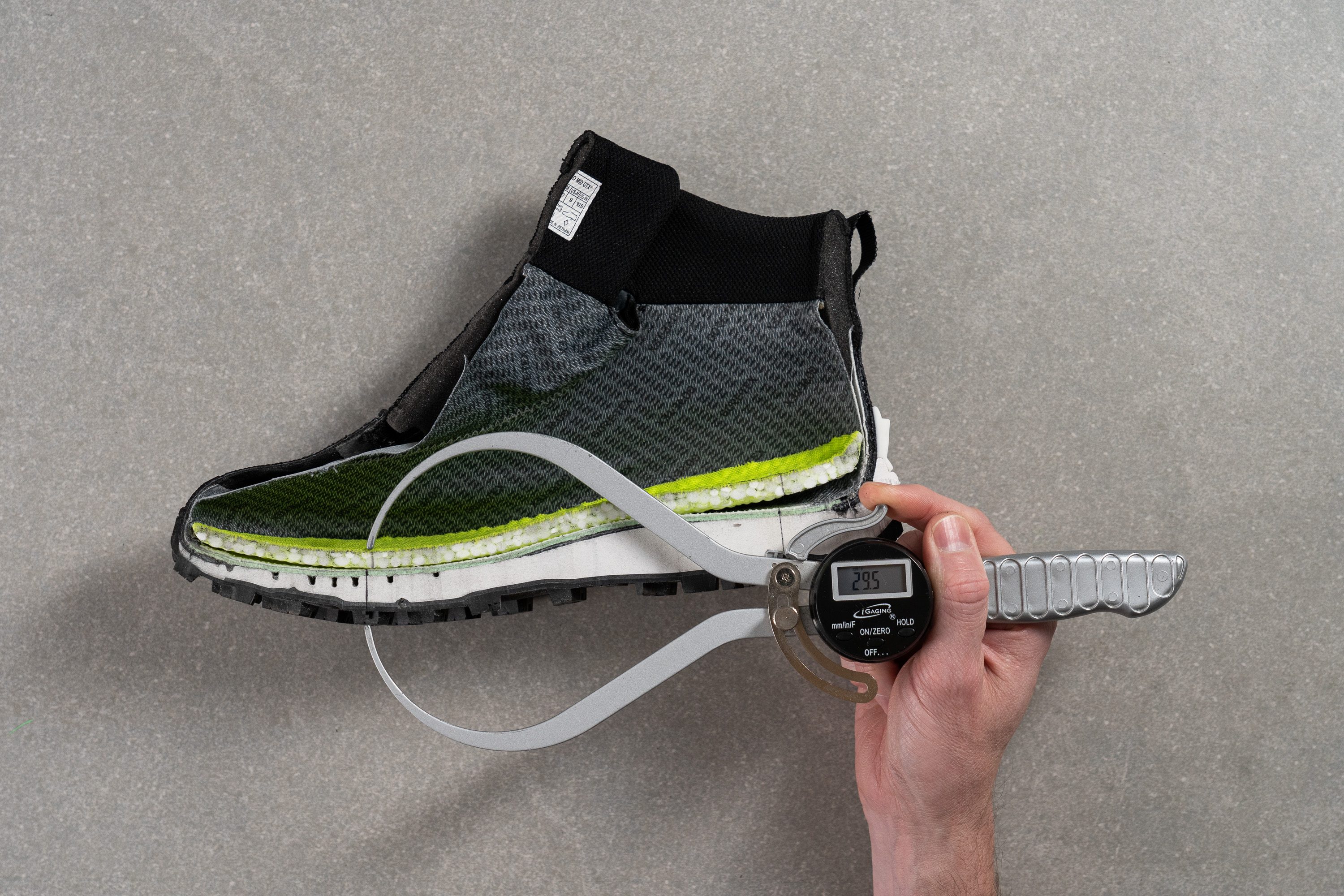
| Roclite Pro Mid GTX | 29.5 mm |
| Average | 23.0 mm |
Drop
Looking at the heel-to-toe offset of this Inov8 hiking boot, we found it to be significantly lower than average at 8.3 mm. Backpacking boots typically have a drop of 12-18 mm in which the elevated heel takes the pressure off the Achilles tendon.
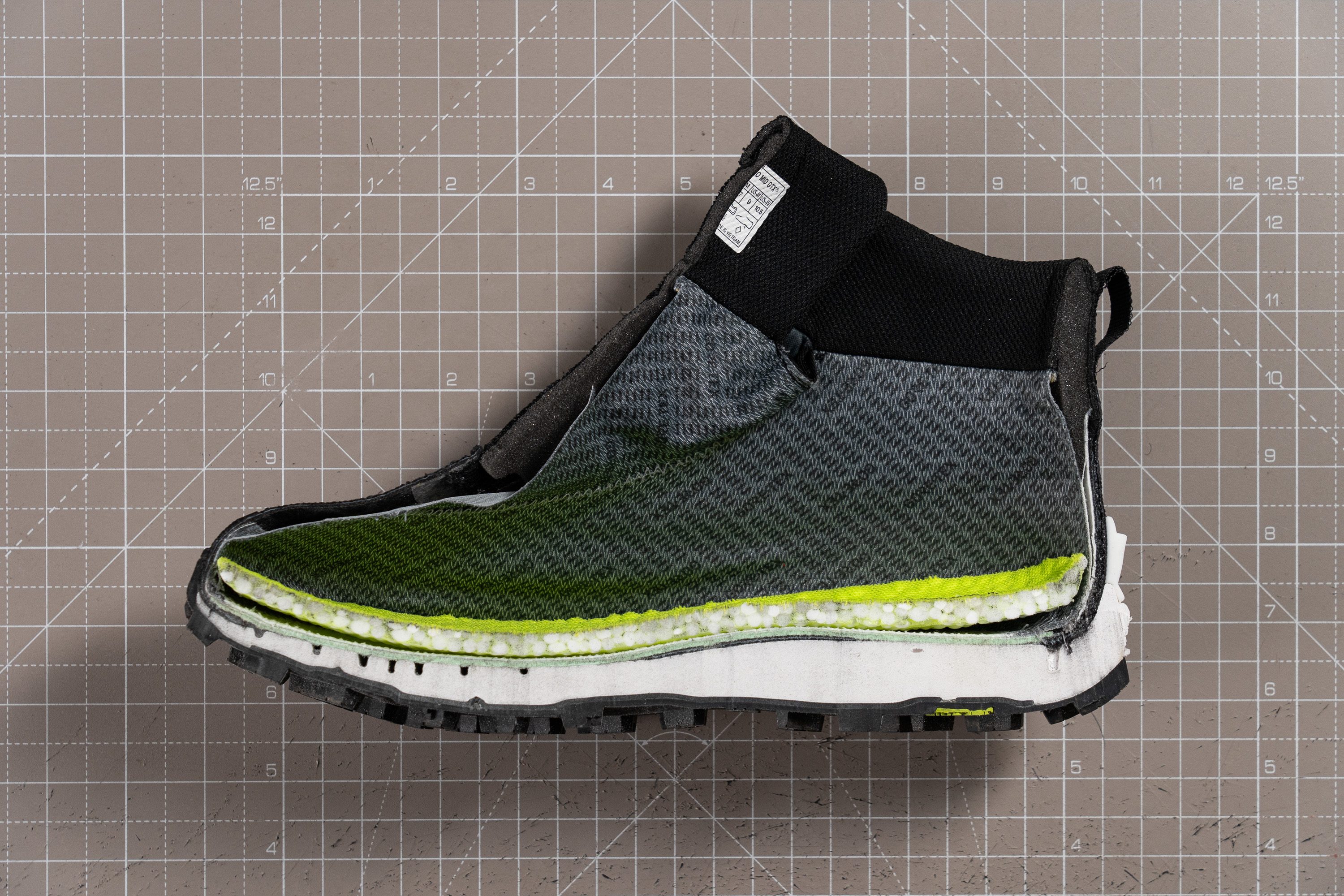
So, if you are planning to carry a heavy backpack or if you have a history of Achilles issues, we recommend opting for a more supportive boot with a higher drop. At least 14 mm, like in the La Sportiva Ultra Raptor II Mid GTX.
| Roclite Pro Mid GTX | 8.3 mm |
| Average | 13.3 mm |
Midsole softness
It felt like the Inov8 Roclite Pro Mid GTX had just enough underfoot softness to feel comfortable and reduce the load on the body but also firm enough to maintain stable landings.
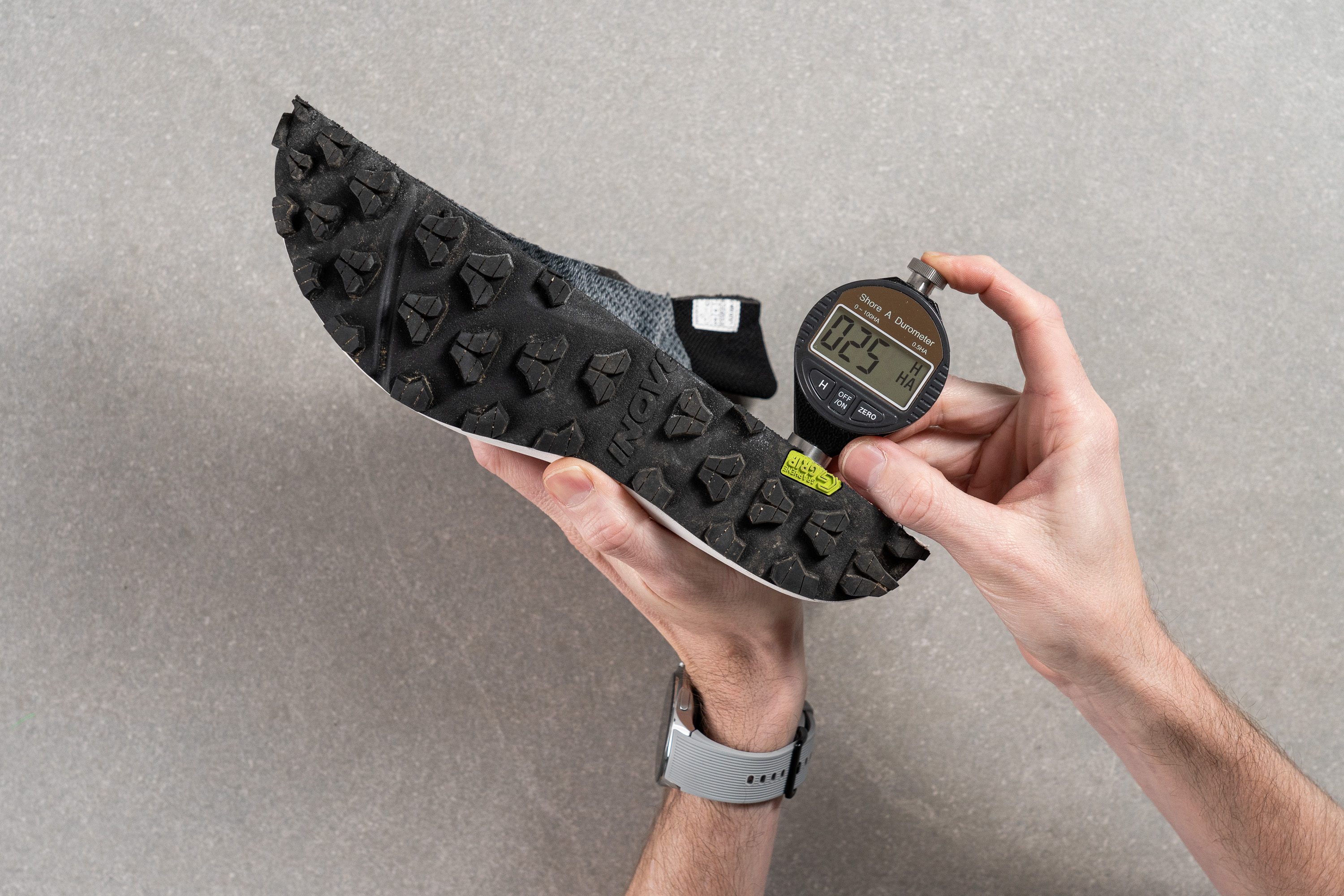
It all made sense when we pressed a durometer against the boot's Powerflow Max foam. At 25.0 HA, it showed a middle-ground reading for a hiking boot midsole.
But in practice, the Roclite Pro Mid GTX feels even firmer than that because of the protective rock plate sandwiched between the foam and the rubber outsole.
| Roclite Pro Mid GTX | 25.0 HA |
| Average | 28.4 HA |
Size and fit
Size
Inov8 Roclite Pro Mid GTX fits half size small (15 votes).
Consider sizing up
Internal length
| Roclite Pro Mid GTX | 267.0 mm |
| Average | 271.4 mm |
Toebox width - widest part
Its large and spacious toebox is one of the first features we noticed in this Inov8 hiking boot. In fact, this boot is only available in Wide fit! So this is what you get by default when ordering the boot.
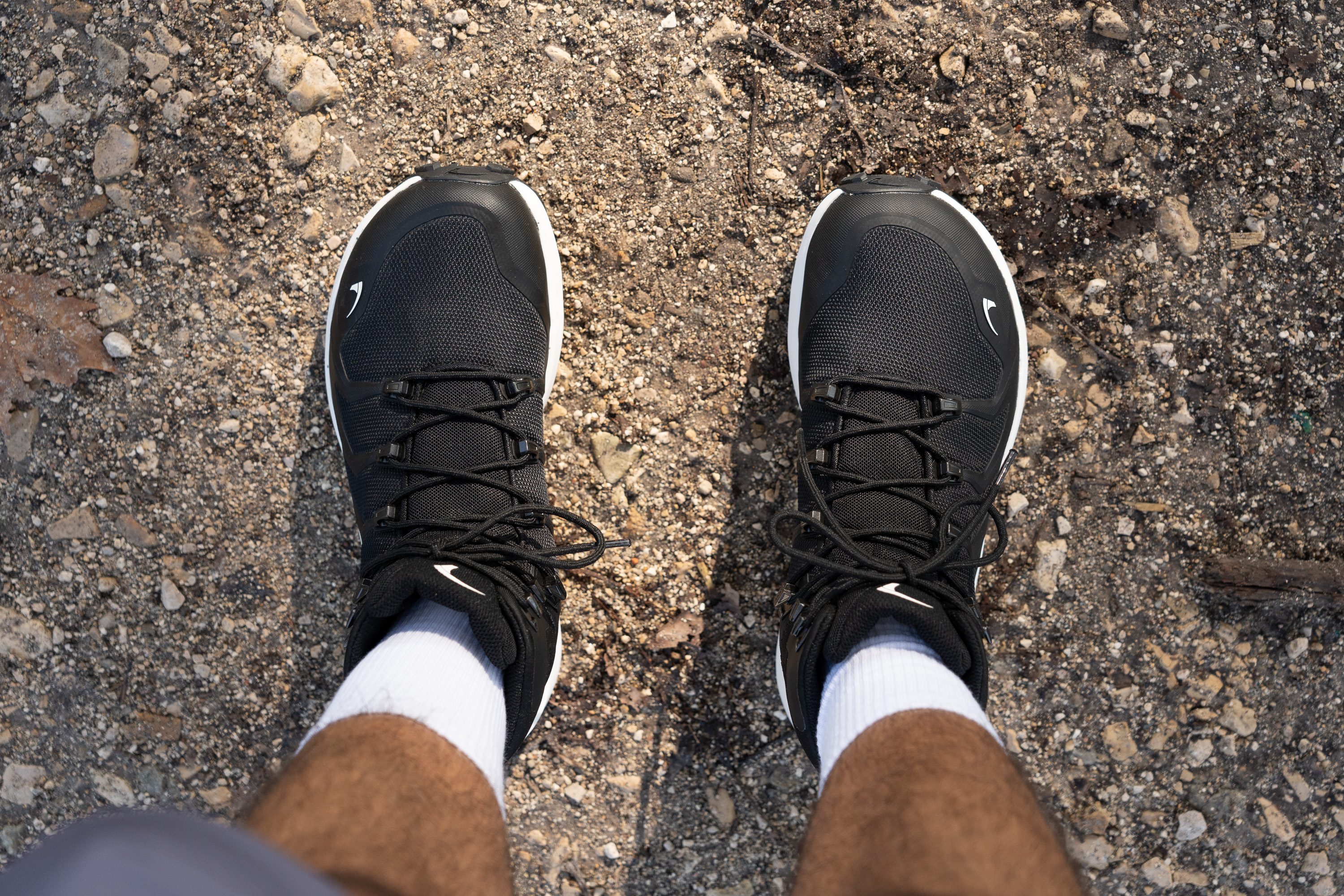
According to Inov8's size and width chart, the boot's forefoot width is supposed to be 100 mm in a men's US size 9. However, our caliper showed an even bigger reading of 106.2 mm!
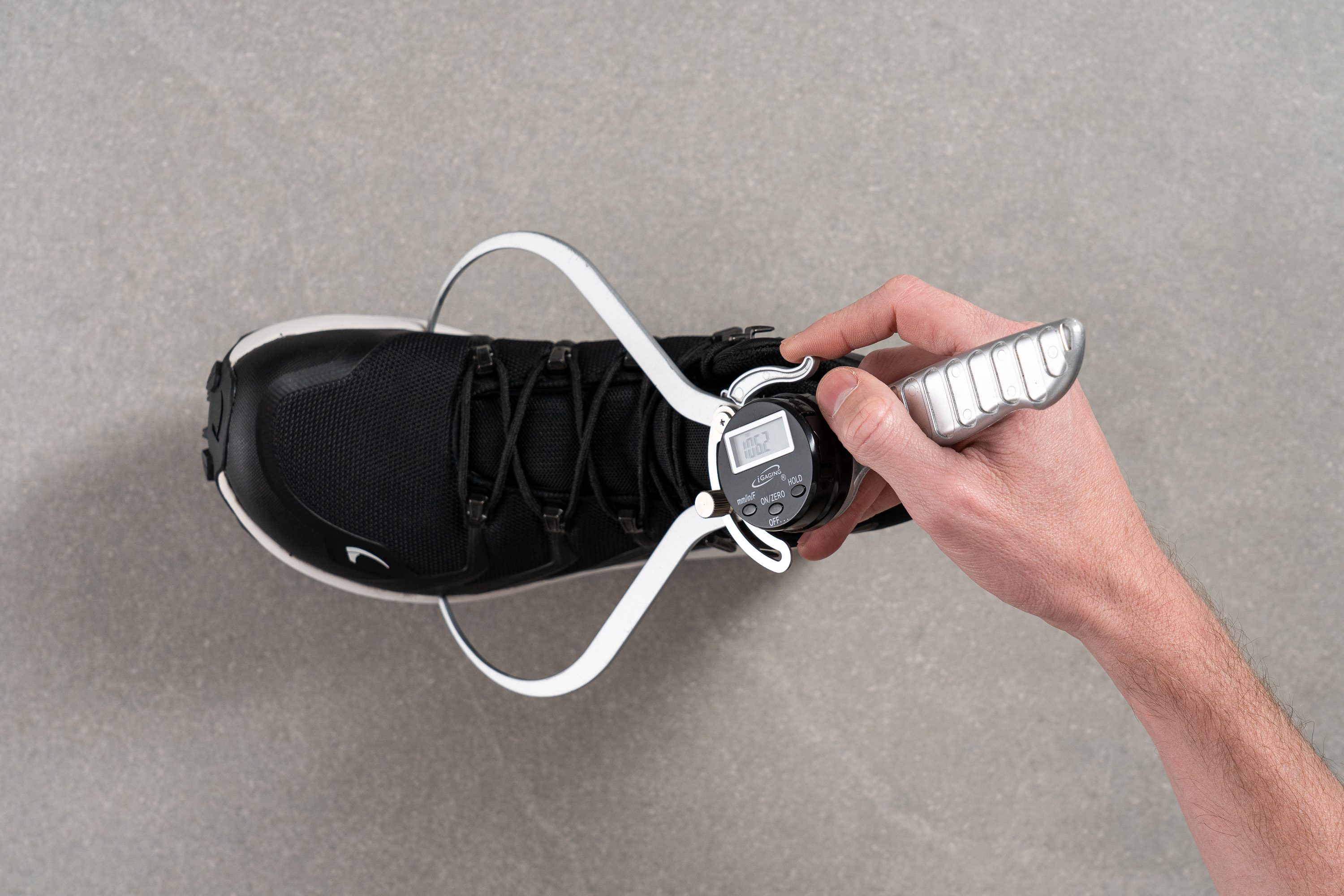
We found that the toebox size and shape of the Roclite Pro Mid GTX is equal to those of KEEN hiking boots.
This test follows an older methodology, which is why you don't see recently tested shoes in the chart. Results from different methodologies can not be compared.
| Roclite Pro Mid GTX | 106.2 mm |
| Average | 102.1 mm |
Toebox width - big toe
Our toes enjoyed all the room they had at their disposal, even with thick socks around them!
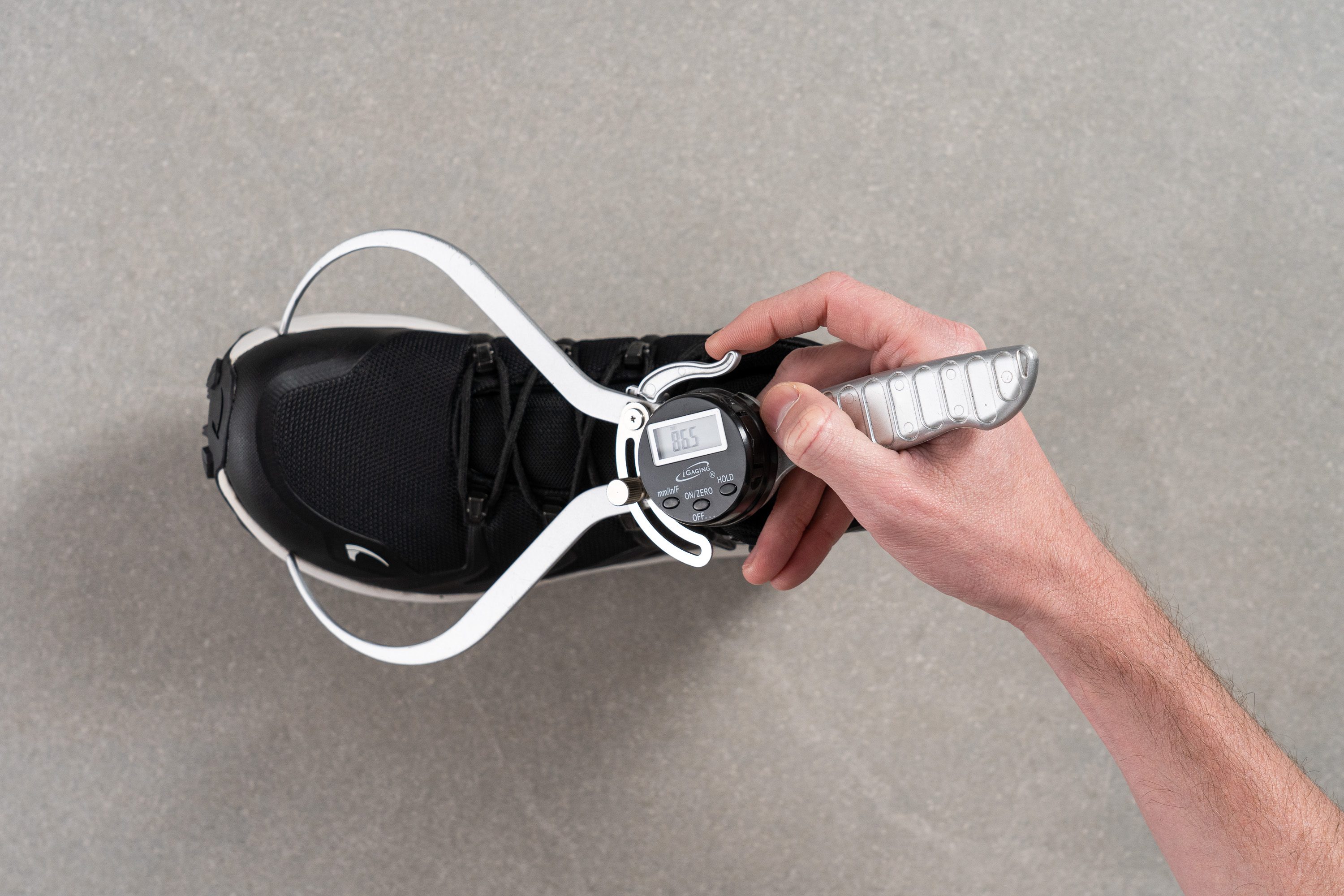
With 86.5 mm of toebox width near the big toe, there was plenty of room for them to splay and swell during the hike.
This test follows an older methodology, which is why you don't see recently tested shoes in the chart. Results from different methodologies can not be compared.
| Roclite Pro Mid GTX | 86.5 mm |
| Average | 78.6 mm |
Traction / Grip
Lug depth
Even though we have reservations about their longevity, the lugs of the Roclite Pro Mid GTX provide unbelievable grip!
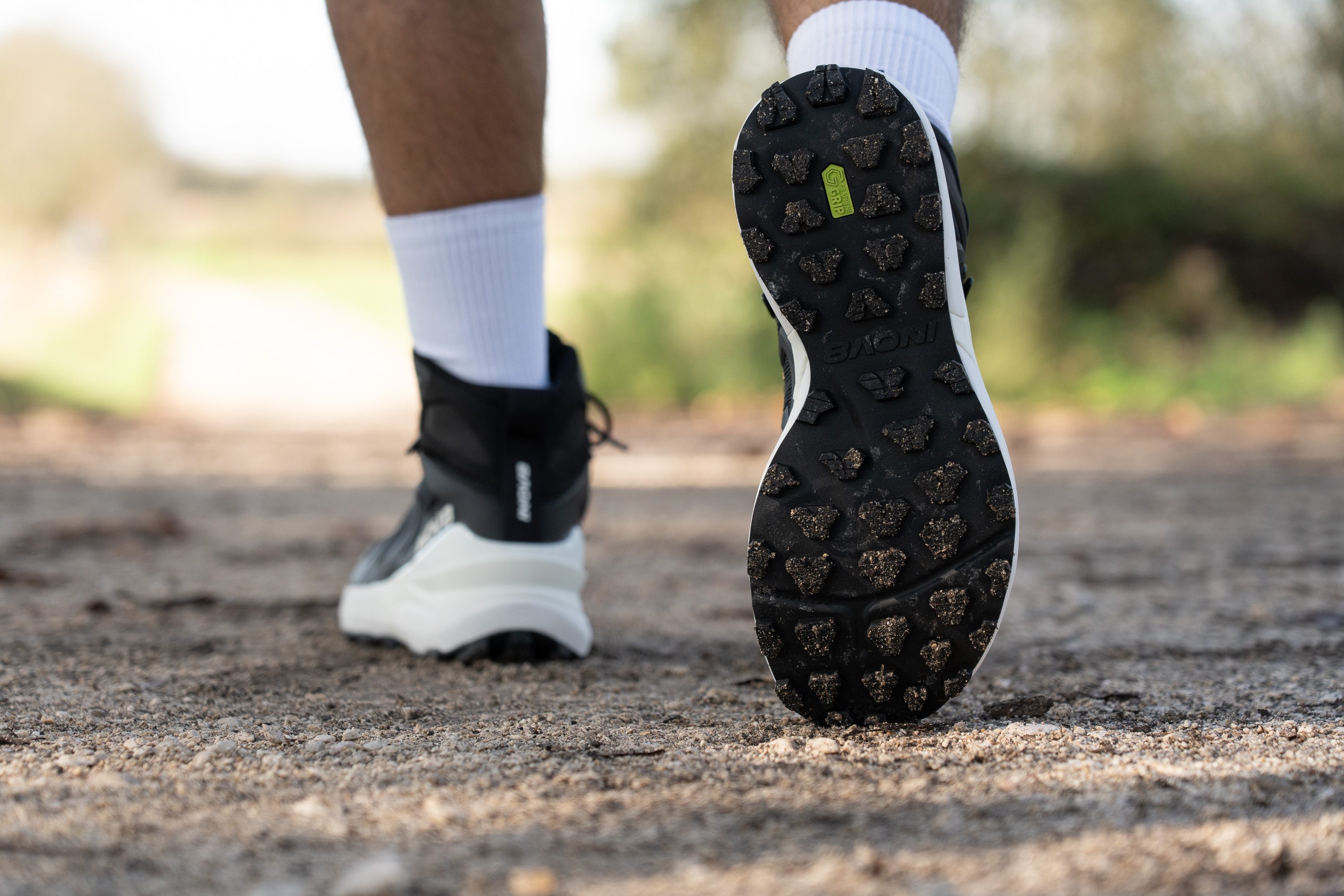
Of course, we were bummed to see 5.3 mm instead of the promised 6 mm on our caliper but still, very few boots can compete with THAT level of toothiness. It is in the top 3 in our lab!
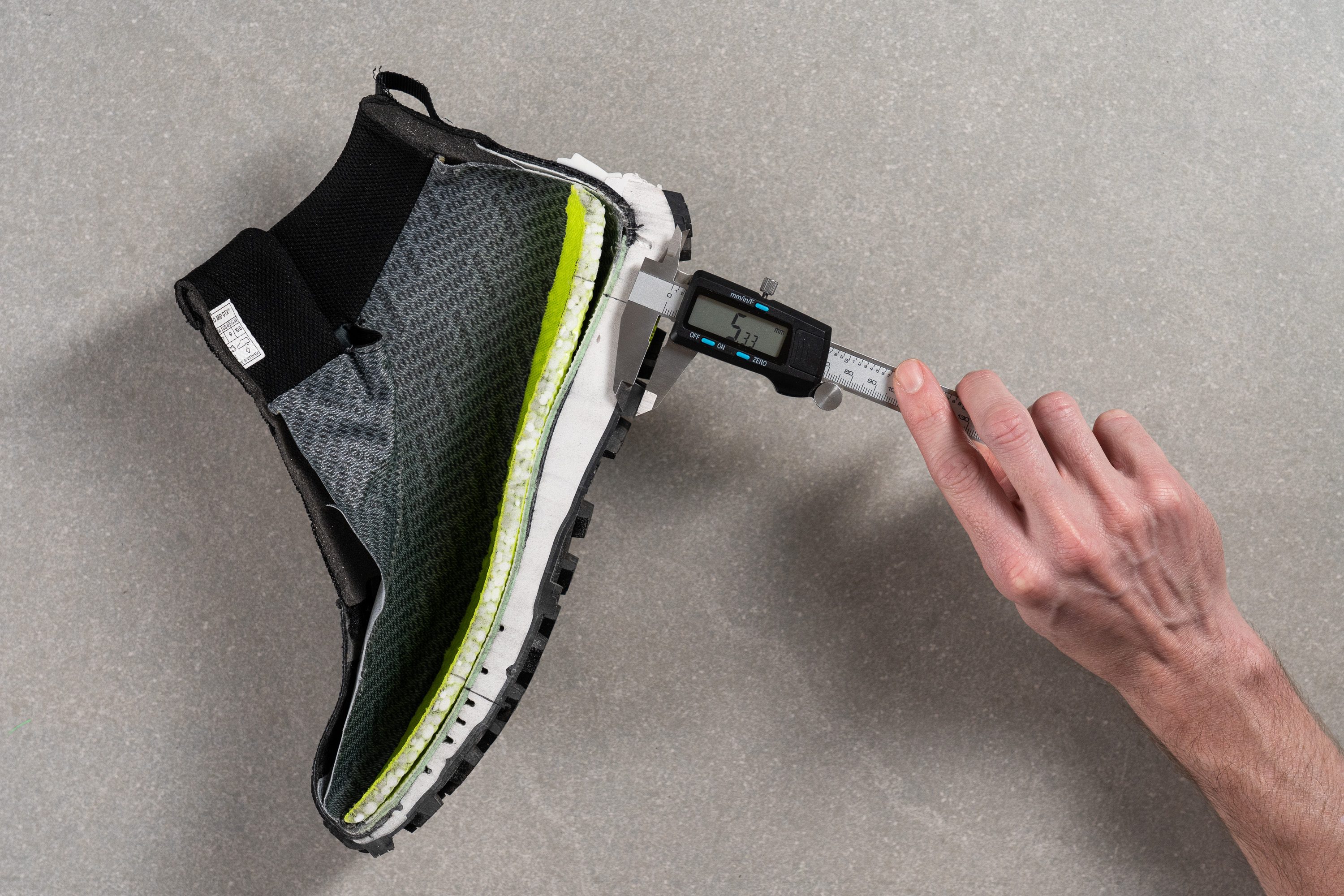
The Roclite's outsole inspired plenty of confidence for digging into mud, stomping through puddles, and balancing on moss-covered logs. Also, their curious shape was inspired by the split hooves of mountain goats and we've got to say, they were irreplaceable for braking on steep descents!
| Roclite Pro Mid GTX | 5.3 mm |
| Average | 4.3 mm |
Flexibility / Stiffness
Even though the Roclite Pro Mid GTX features a full-length Meta-Plate rock plate, it leaves some room for flexibility in the forefoot.
As our stiffness test showed, the boot is not hopelessly stiff, requiring 47.2N to bend to a 90-degree angle. For reference, some popular backpacking boots like the Salomon Quest 4 GTX need as much as 60N and a few boots require up to 80N to bend!
This test follows an older methodology, which is why you don't see recently tested shoes in the chart. Results from different methodologies can not be compared.
| Roclite Pro Mid GTX | 47.2N |
| Average | 44.3N |
Stiffness in cold (%)
However, if you are camping and the temperatures drop at night, expect the Roclite to feel notably stiffer first thing in the morning.
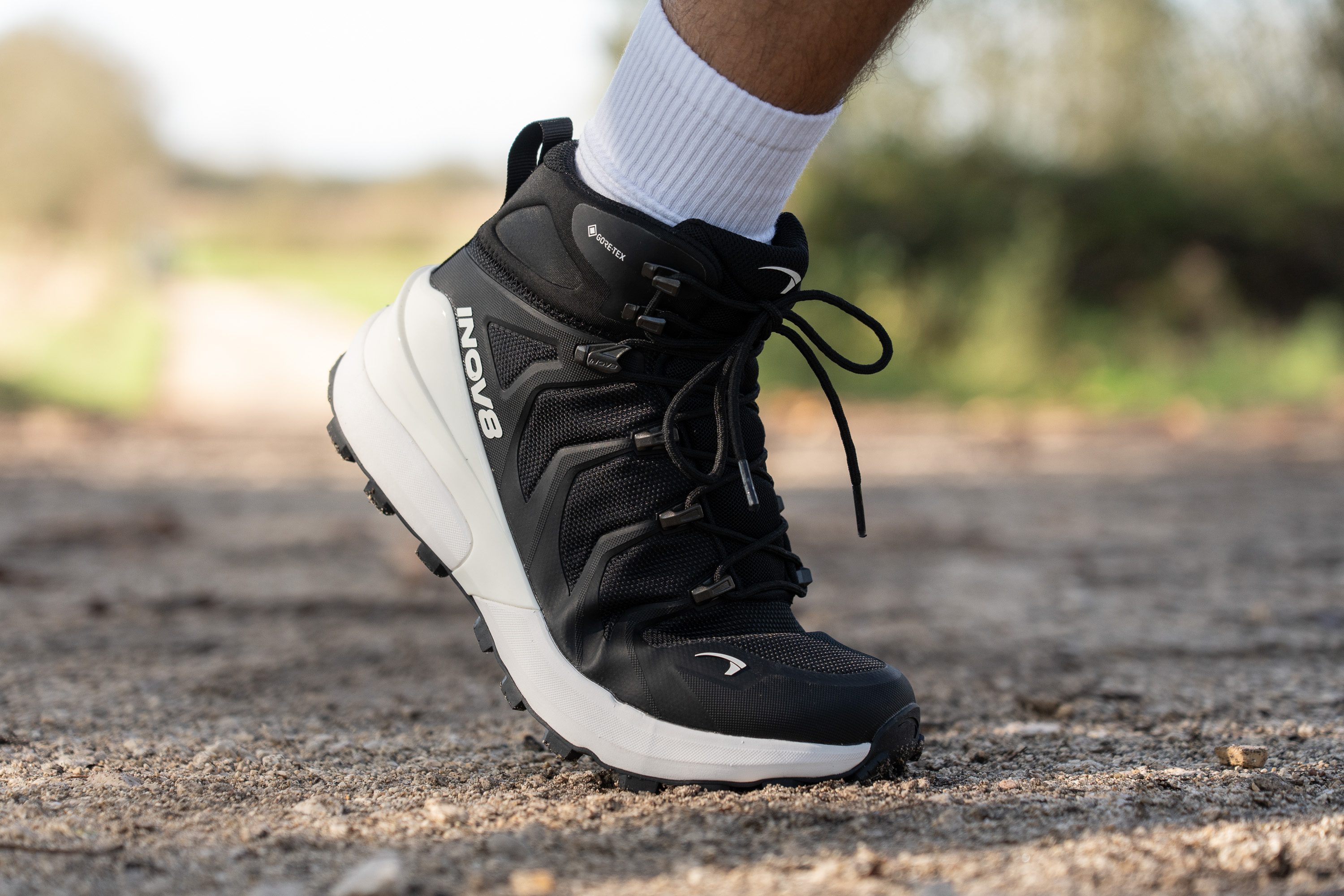
Having kept the boot in the freezer for 20 minutes, we discovered that it needed 36.3% more force to bend it reaching 64.3N on our force gauge.
So when you get back on the trail the next day, the boot will need some breaking in before it returns to its default level of flexibility and softness.
| Roclite Pro Mid GTX | 36% |
| Average | 24% |
Weight
The average weight of backpacking boots in our lab hovers around 21 oz (595g).
In that context, the Inov8 Roclite Pro Mid GTX is indeed a lighter option at 18.3 oz (519g) in a men's US size 9. We never felt like the boot's weight felt excessive on our feet nor did it leave our legs beaten up after a long hike.
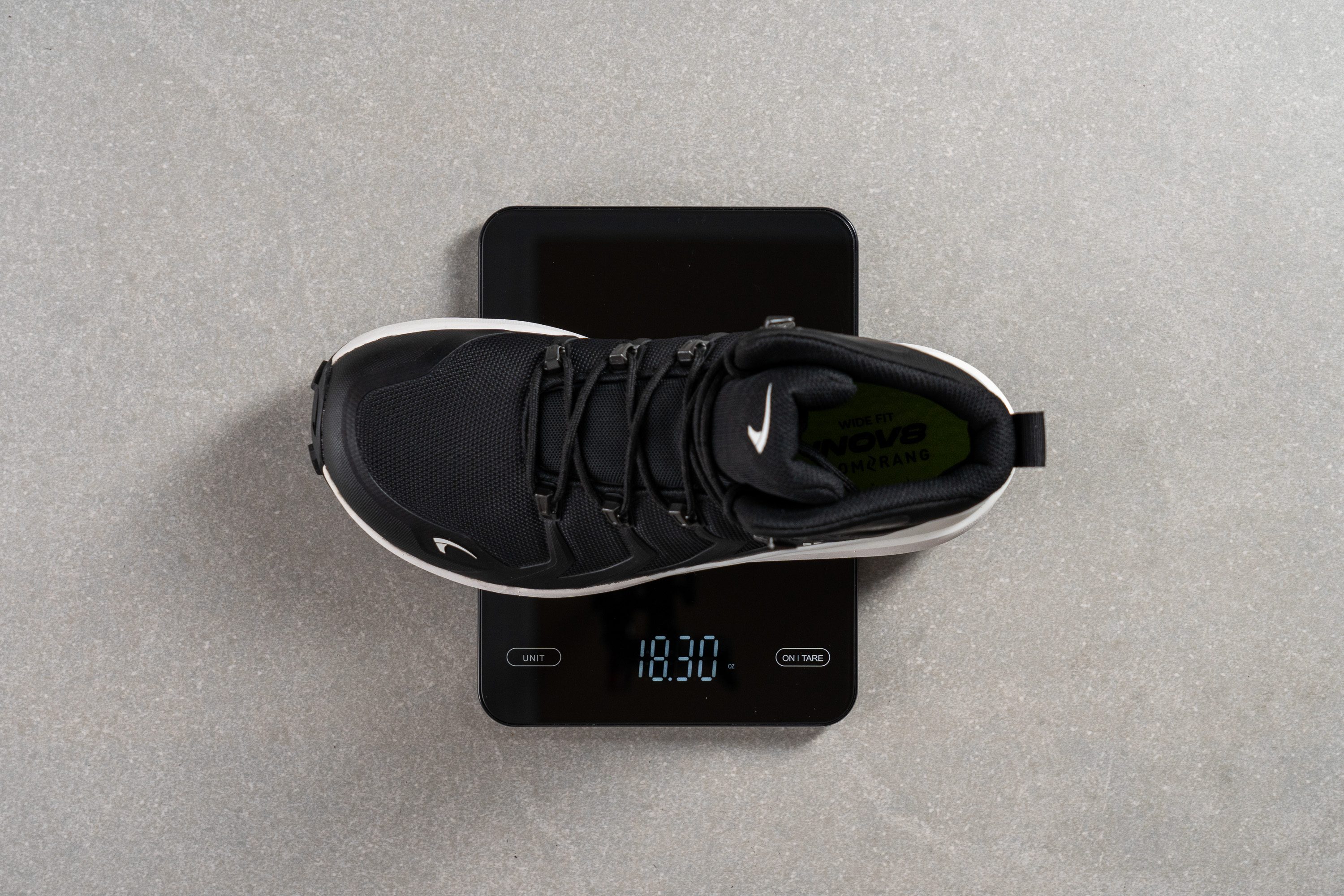
But if you are searching for the lightest possible boot that can handle backpacking, the La Sportiva Ultra Raptor II Mid GTX is one of the best options at 14.7 oz (415g).
| Roclite Pro Mid GTX | 18.3 oz (519g) |
| Average | 18.7 oz (531g) |
Breathability
Even though the Gore-Tex membrane is generally promised to expel sweat as vapor, we found zero signs of breathability in the Roclite Pro Mid GTX.
Meticulously studying the results of our smoke-pumping test, there wasn't a hint of vapor passing through the boot's toebox.
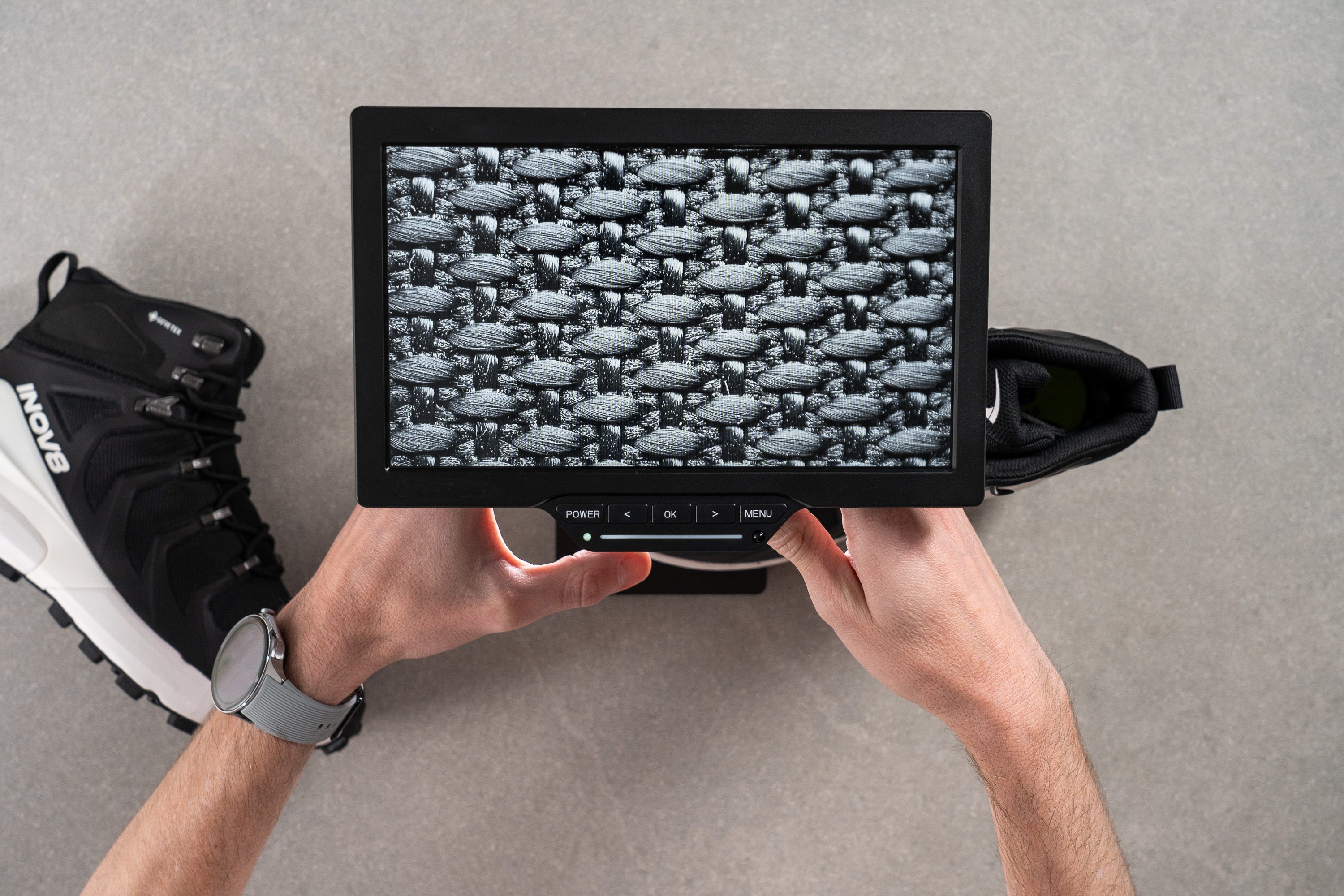
Even though it uses a lot of textile for the upper, our microscope revealed that it is an incredibly densely woven and airtight material.
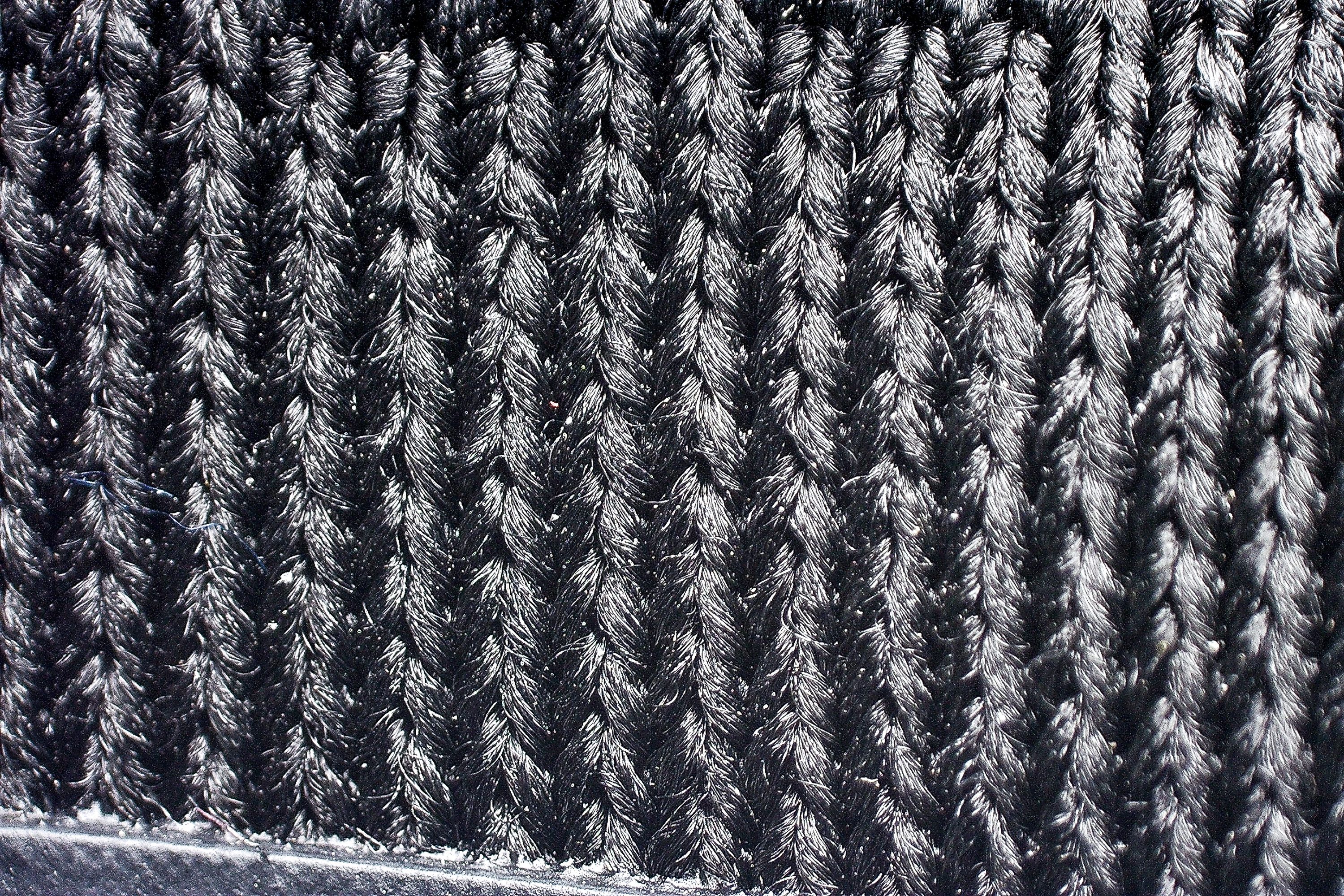
Considering the absence of ventilation in this Inov8 boot, we gave it the lowest breathability score of 1 out of 5. On the flip side, it is a warm and waterproof hiking boot that can keep your feet dry and cozy in challenging weather conditions.
P.S. However, we do appreciate the internal moisture management of this boot which is kindly provided by the perforated insole.
| Roclite Pro Mid GTX | 1 |
| Average | 1.3 |
Stability
Lateral stability test
Planning a high-mileage backpacking adventure over varied terrain? Our stability tests show that the Inov8 Roclite Pro Mid GTX will keep you fully covered!
From the ground up, the boot is equipped with stability elements that offer excellent side-to-side containment, even on hilly terrain.
Torsional rigidity
We believe it would take some serious effort to roll your ankle in the Roclite Pro Mid GTX. Its highly rigid construction made our feet feel like they were inside a bowling alley - not a chance to roll over the edge!
When we attempted to twist the boot with our bare hands, it refused to yield even one bit. Not surprising considering the large and stiff TPU clip around its heel, a full-length rock plate, and the ribcage-like meta cradle around the midfoot.
Oh, and of course the Roclite Pro Mid GTX received the highest possible score for torsional rigidity!
| Roclite Pro Mid GTX | 5 |
| Average | 4.4 |
Heel counter stiffness
The external TPU heel clip plays another key role in the boot. It creates a highly rigid area around the heel and ankle locking them securely and eliminating any foot play inside the boot. This is particularly crucial for maintaining stability with a heavy load on your shoulders.
Once again, this Inov8 boot receives the highest stiffness score - 5 out of 5 for the heel counter stiffness.
| Roclite Pro Mid GTX | 5 |
| Average | 3.6 |
Midsole width - forefoot
In backpacking, you want to be 100% sure of your next step, especially deeper into the hike when your legs become increasingly tired and less precise.
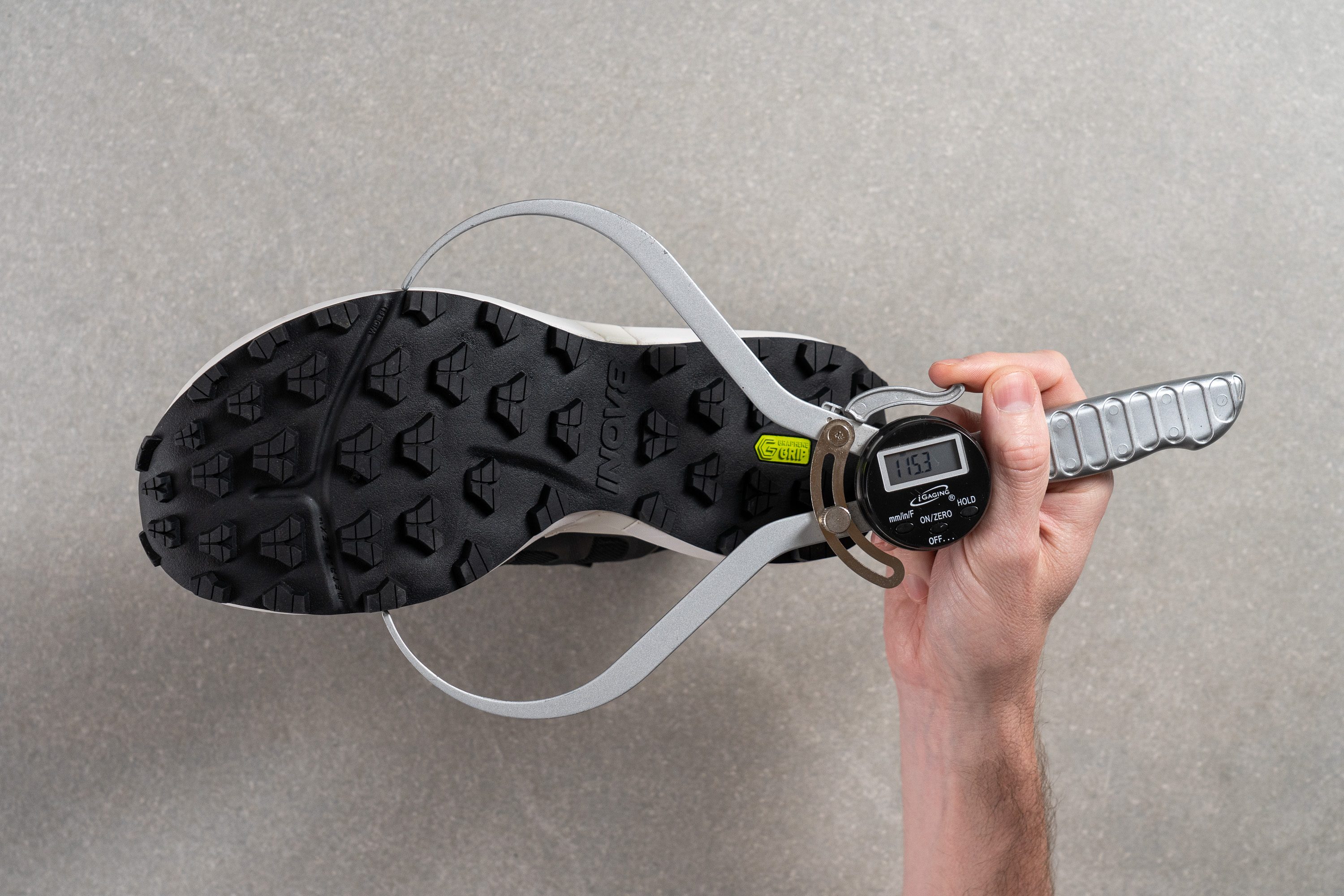
We found that the Roclite Pro Mid GTX has no issue with that. The boot's midsole opened our caliper by as much as 115.3 mm in the widest part of the forefoot.
| Roclite Pro Mid GTX | 115.3 mm |
| Average | 111.5 mm |
Midsole width - heel
The boot's stability wouldn't be complete without a wide heel to lean on. We have zero complaints about the Roclite's heel as it showed a standard 85.8 mm width on our caliper.
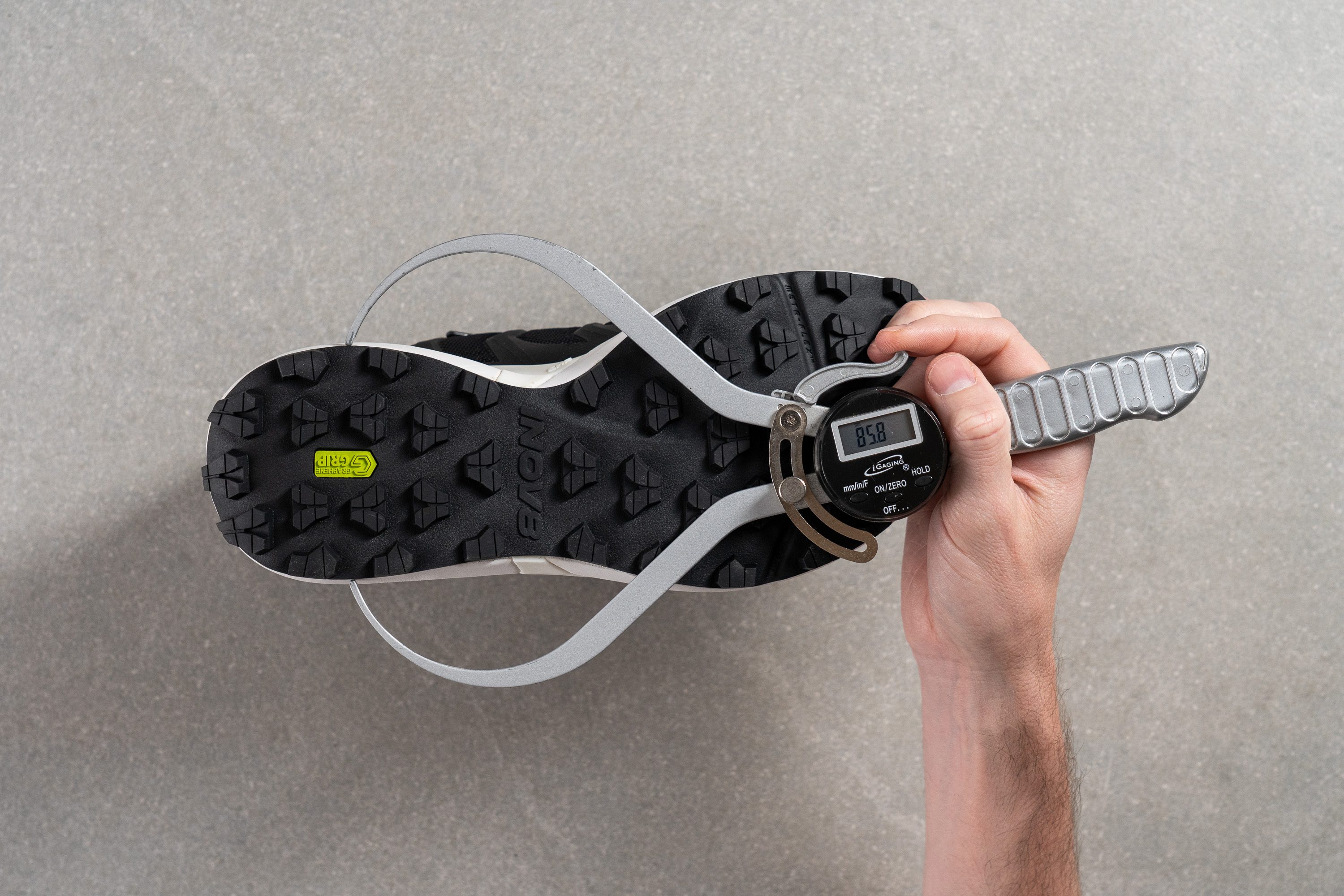
Unless you prefer a more massive heel like that of the Hoka Kaha 2 GTX with a whopping measurement of 106.1 mm!
| Roclite Pro Mid GTX | 85.8 mm |
| Average | 87.6 mm |
Durability
Toebox durability
Ballistic nylon is the name of the textile you saw in our microscope photos above. The brand's description of this material sounded rather promising ("so tough, it was developed for flak jackets") but unfortunately, its performance in our Dremel test left us wishing for more.
In less than 12 seconds of drilling it with sandpaper, the material showed serious signs of deterioration. Because of that, we gave it a below-average score of 3 out of 5.
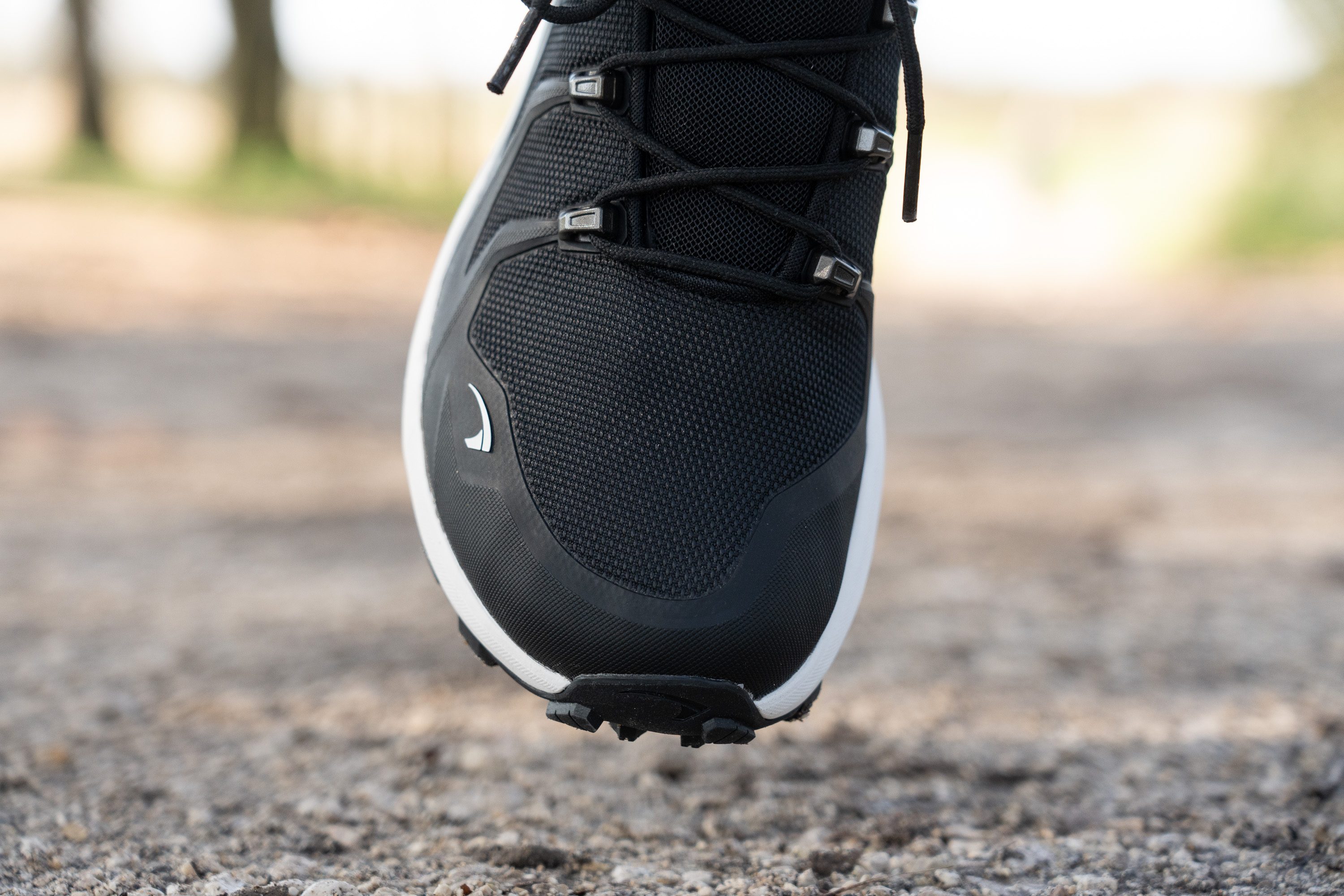
On the bright side, we are glad to see a large rubber toe bumper and a wide mudguard on top of it. These are the boot's primary source of protection against direct hits to rocks and roots.
| Roclite Pro Mid GTX | 3 |
| Average | 4.3 |
Heel padding durability
We were even more disappointed with the wear resistance of the boot's internal fabric lining.
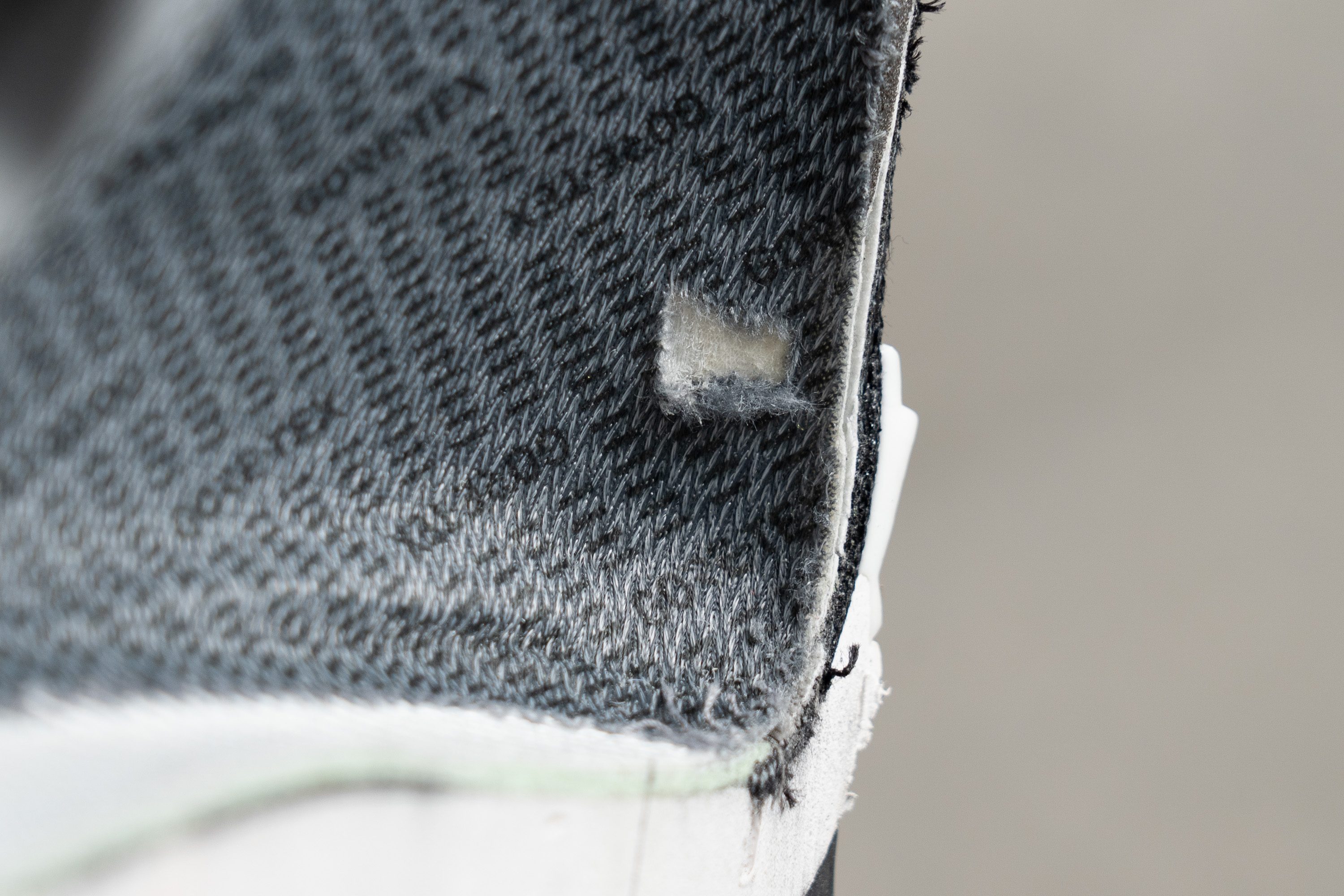
The hole you see above appeared in less than 4 seconds of sandpaper exposure. And once that lining is torn, the boot's entire waterproofing capacity becomes compromised.
That calls for 1 out of 5 for heel padding durability.
| Roclite Pro Mid GTX | 1 |
| Average | 3.6 |
Outsole hardness
Inov8 made a big hit a few years ago when it became the first brand to introduce this extra-durable Graphene rubber in its footwear.
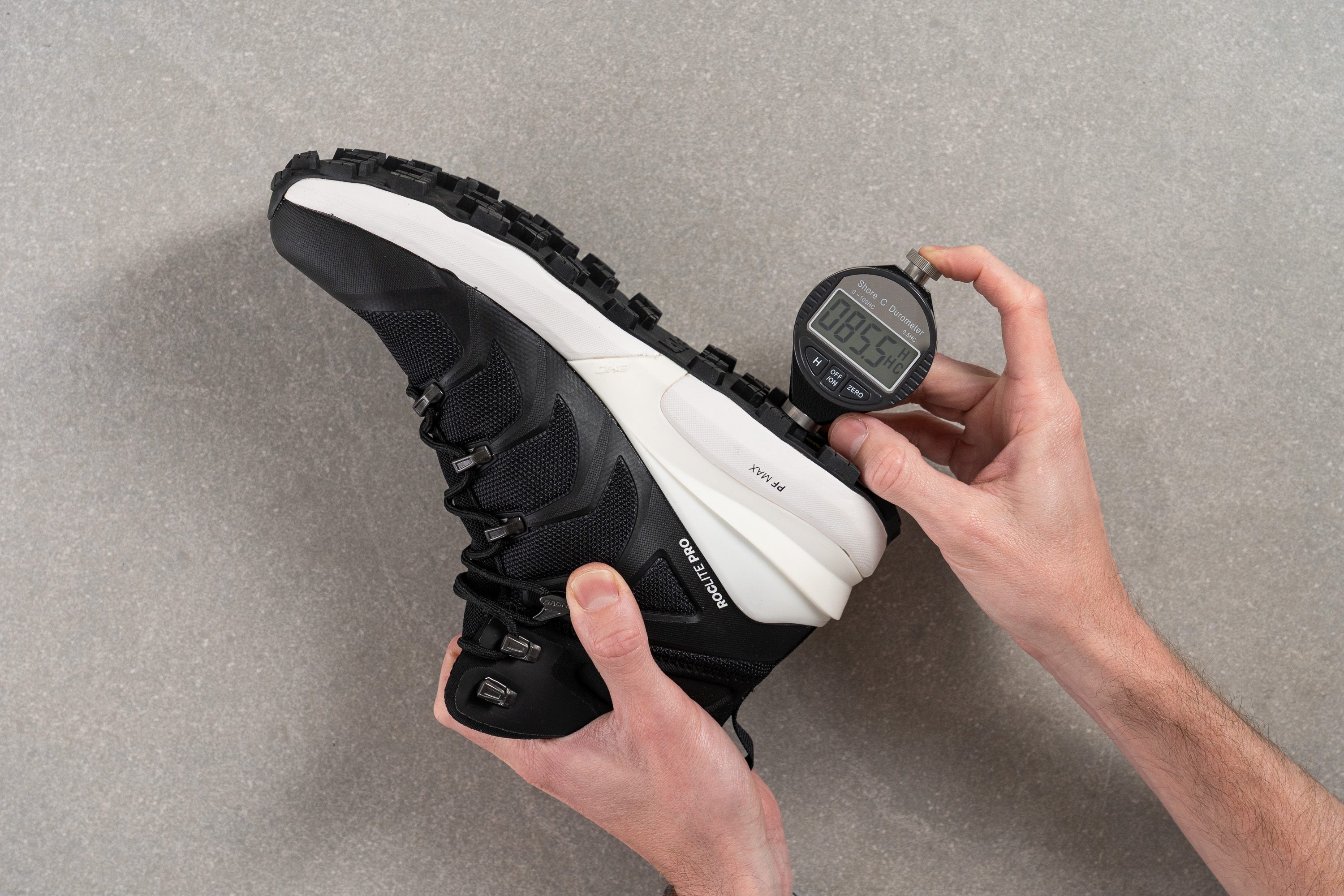
But even though the compound proved to be just as hard as the average hiking boot outsole, its abrasion resistance was far from impressive.
| Roclite Pro Mid GTX | 85.6 HC |
| Average | 87.1 HC |
Outsole durability
Our Dremel met little resistance from the rubber as it joyfully munched on one of the boot's lugs.
Measuring the depth of the Dremel bite with a tread gauge, we found it to be deeper than average at 1.4 mm. Not the strongest performance.
Even though there is a lot of lug depth to go through in this Inov8 boot, we wouldn't want to lose the grip prematurely by losing half of the lug depth!
| Roclite Pro Mid GTX | 1.4 mm |
| Average | 0.8 mm |
Outsole thickness
Because it went for very deep lugs, the Roclite did not put a lot of rubber into the base outsole layer. Our caliper measured only 1.8 mm of rubber thickness there.
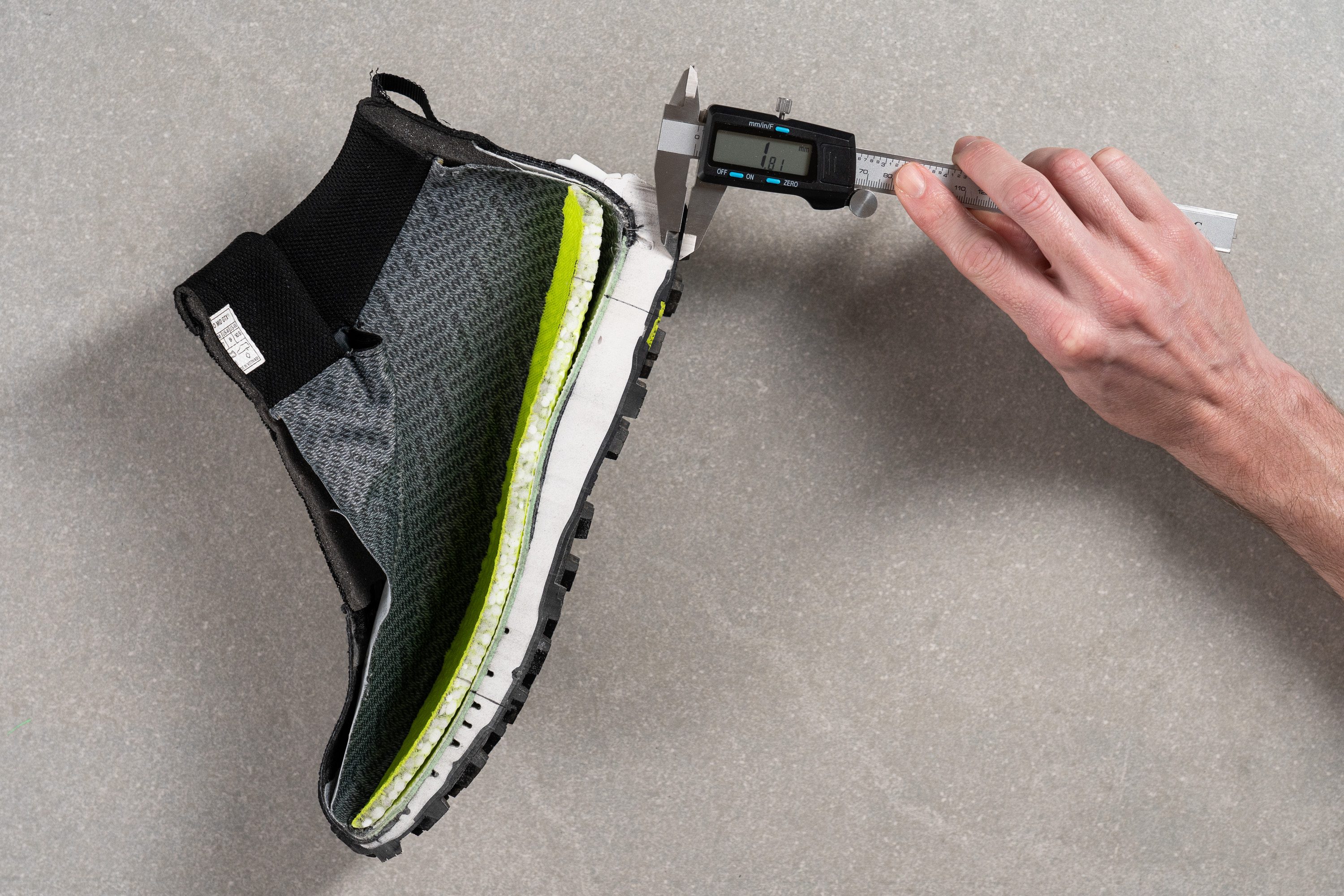
And it makes sense because it helps to keep the boot's weight down without a major compromise.
| Roclite Pro Mid GTX | 1.8 mm |
| Average | 2.9 mm |
Misc
Insole thickness
The Boomerang insole of the Roclite Pro Mid GTX deserves special attention because it is nothing like the plain flat sockliner that you might expect.
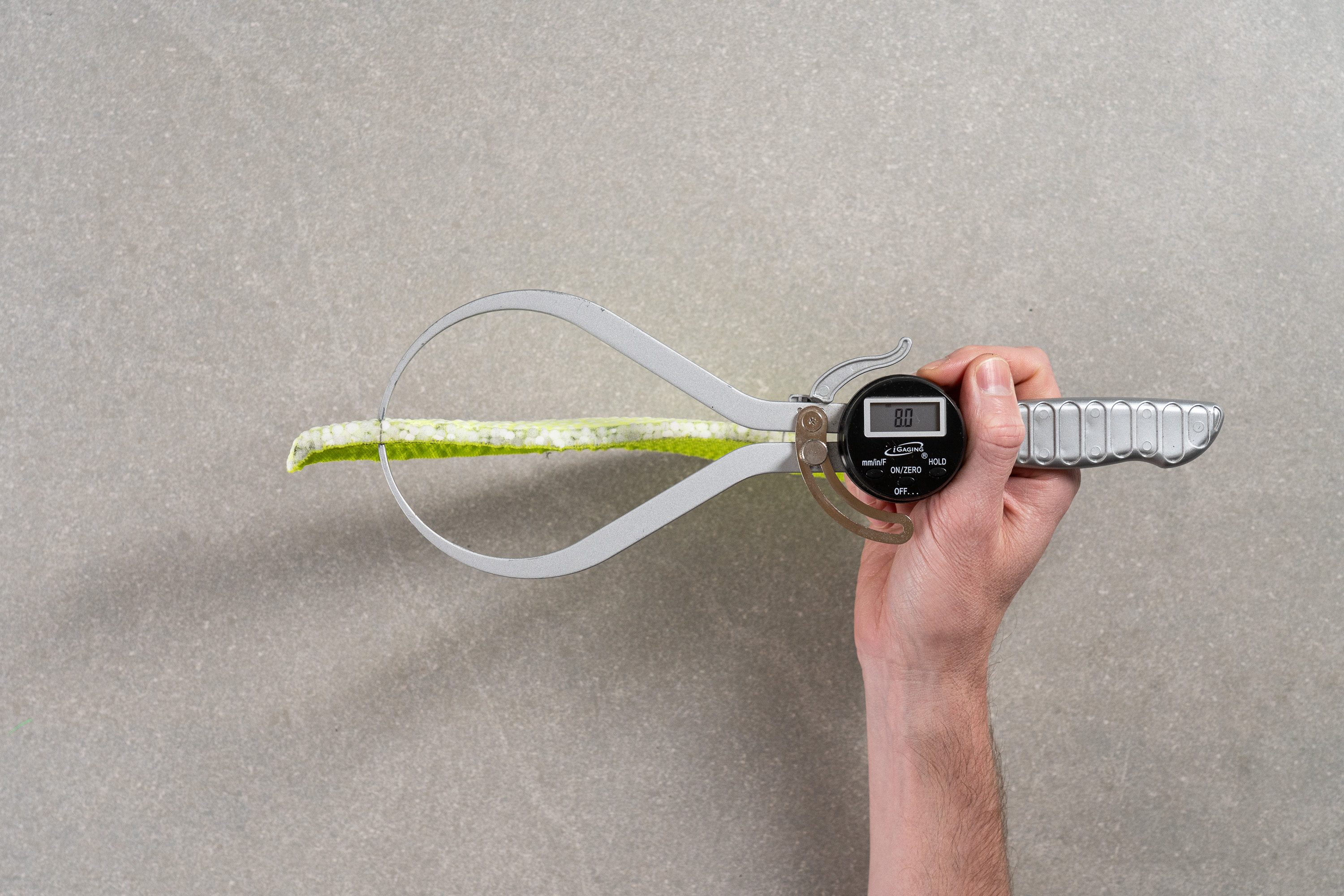
First of all, it is one of the cushiest insoles we've encountered showing 8.0 mm of thickness in the heel. Secondly, it is comprised of hundreds of tiny foam beads (sort of like Adidas Boost) which bounce back after being compressed.
It made the underfoot experience much livelier and we loved this touch of springiness for long hikes.
| Roclite Pro Mid GTX | 8.0 mm |
| Average | 6.0 mm |
Removable insole
It takes no effort to remove the Boomerang insole of this Inov8 boot. But do we recommend it? Not really. It is in fact a high-quality insole that is well-padded, bouncy, and accommodates the boot's wide fit.
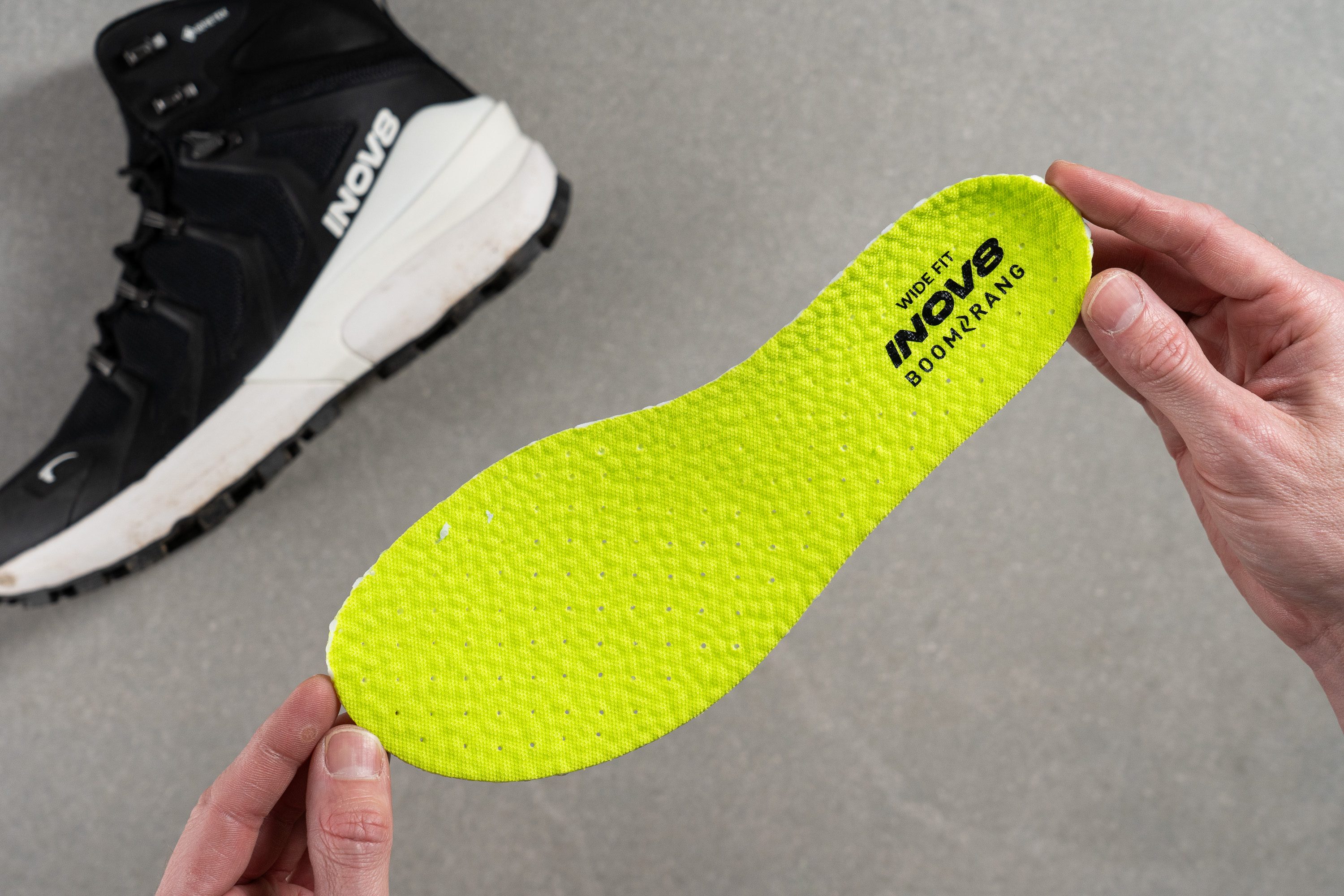
| Roclite Pro Mid GTX | Yes |
Midsole softness in cold (%)
To make sure that the Inov8 Roclite Pro Mid GTX does not turn into a brick when the mercury drops below 30°F, we tested its midsole behavior in low temperatures.
Gladly, it did not get much firmer than the average hiking boot.
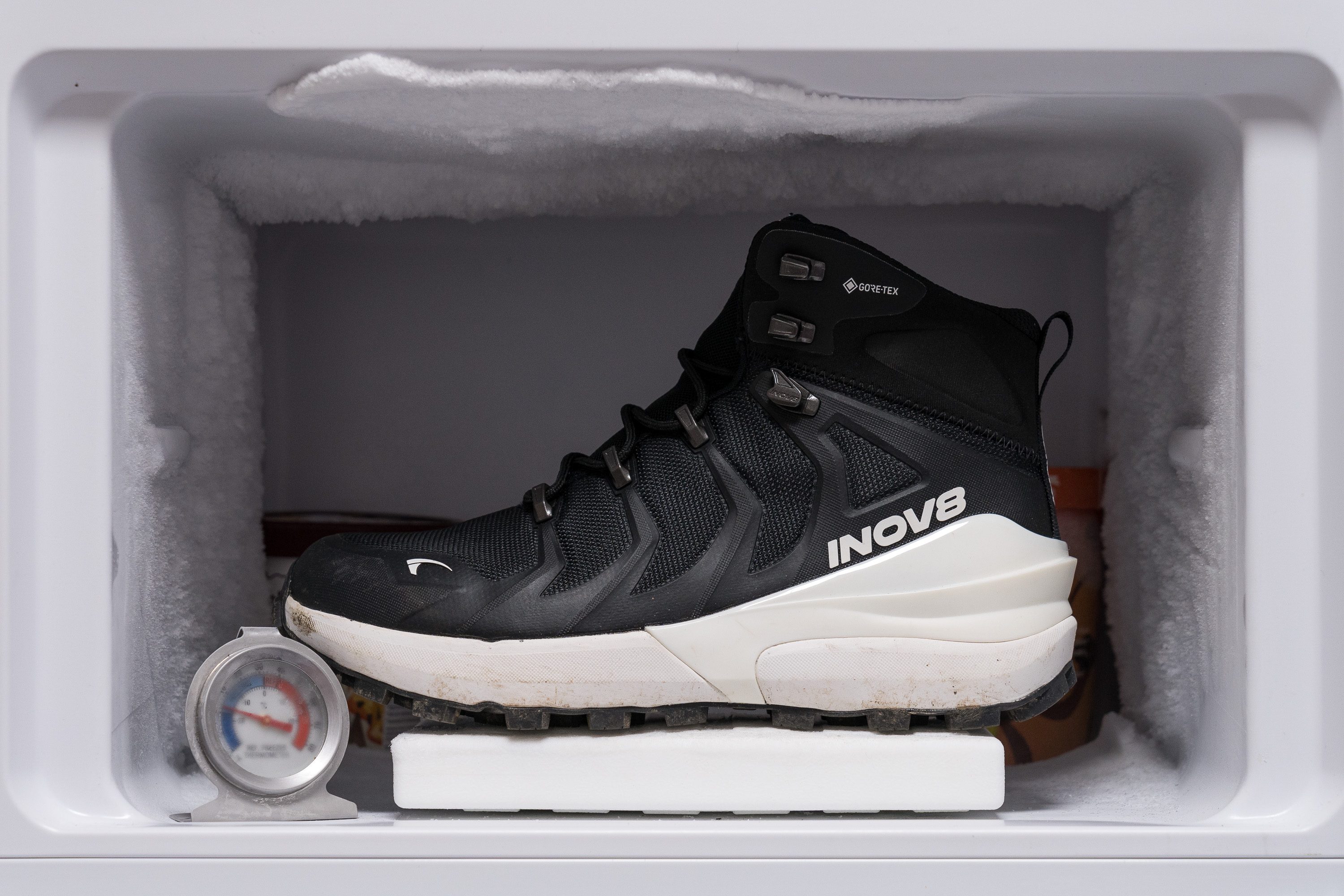
After being confined in the freezer for 20 minutes, the boot's Powerflow Max midsole showed a moderate 22.5% change in softness.
| Roclite Pro Mid GTX | 23% |
| Average | 20% |
Reflective elements
With no reflective elements, there is no shining in the dark with the Roclite Pro Mid GTX.
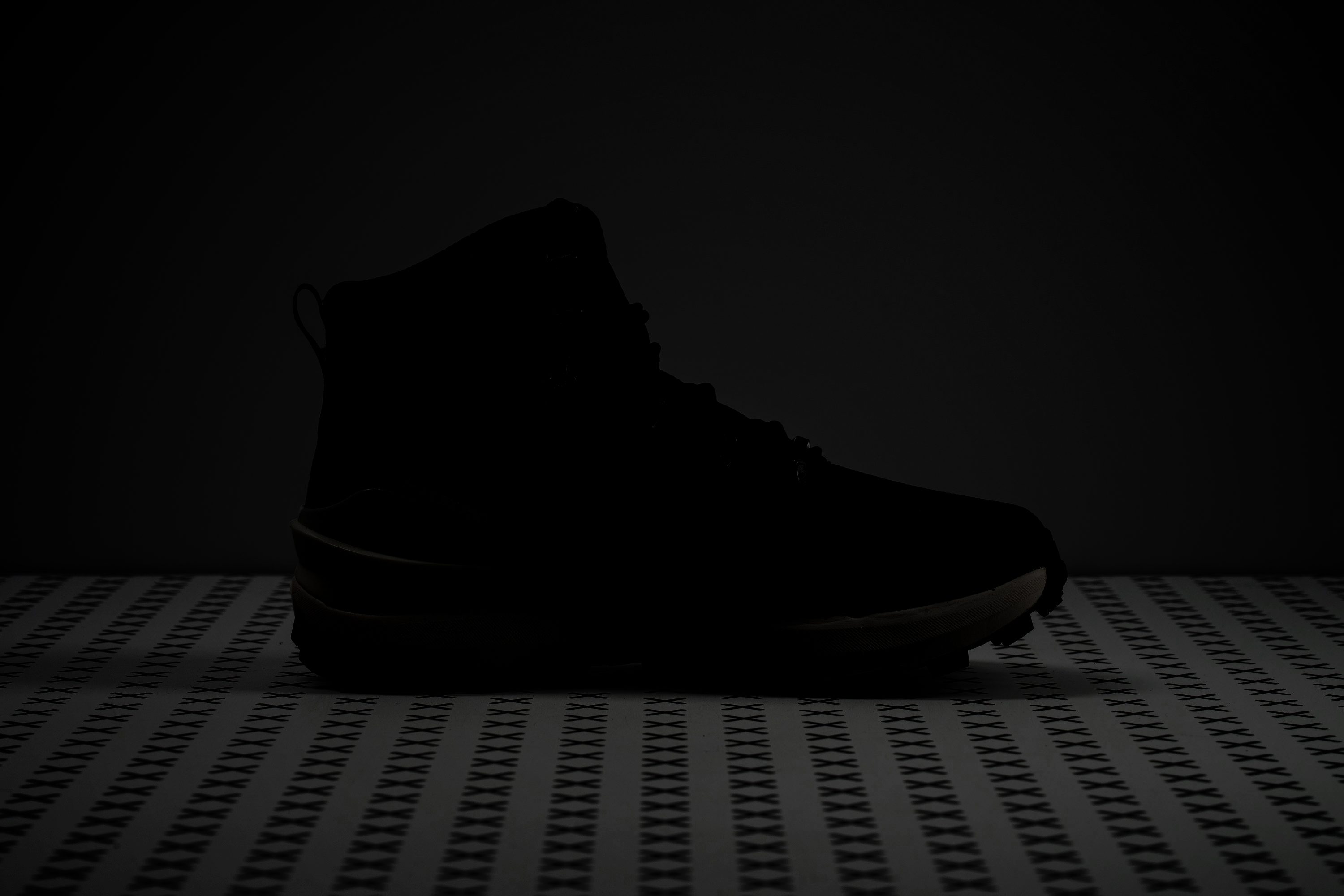
| Roclite Pro Mid GTX | No |
Tongue padding
Positioned as a lightweight hiking boot, the Roclite keeps its internal padding to a minimum. There is no abundant padding around the collar or on the tongue. The latter showed a moderate reading of 7.9 mm on our caliper.
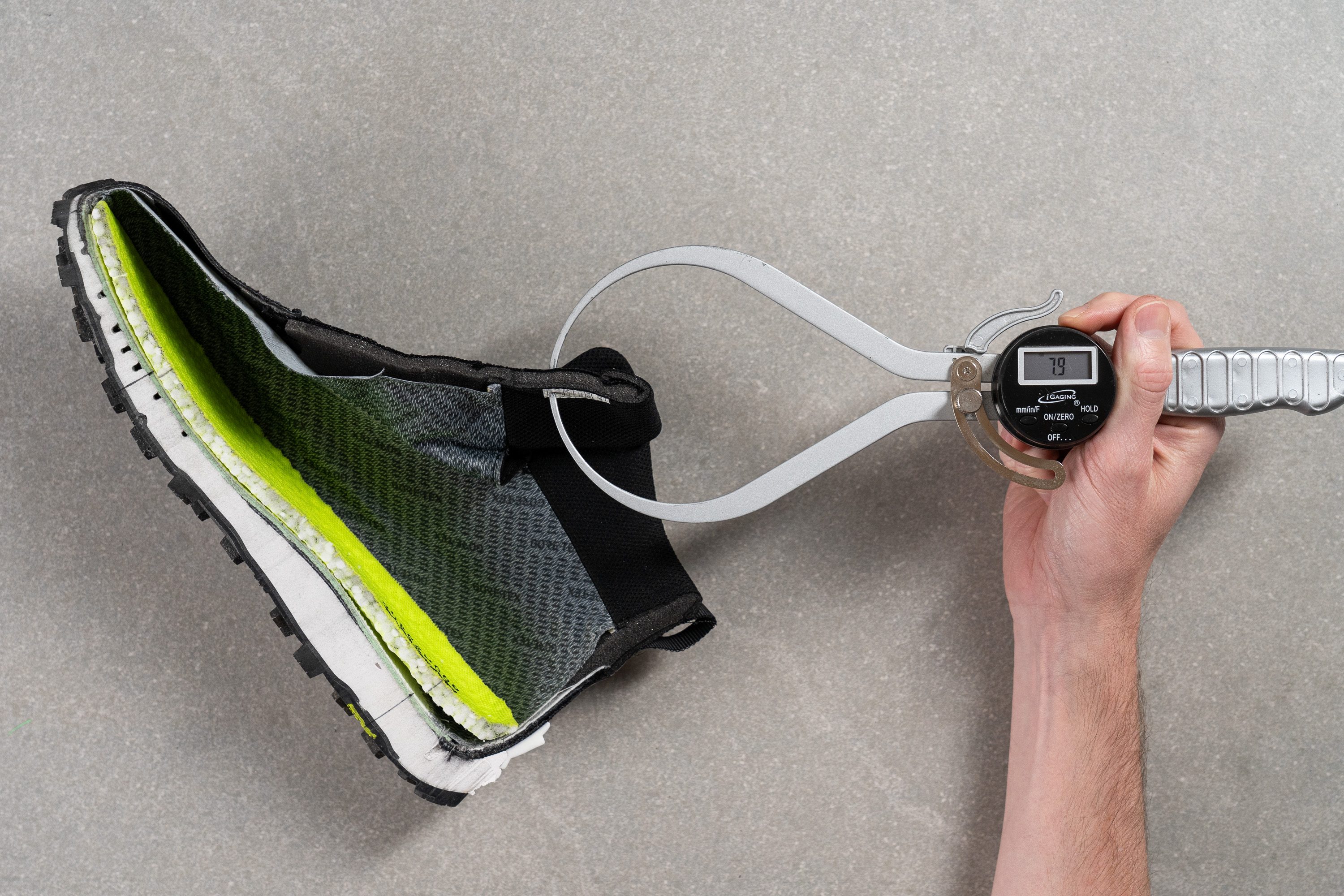
| Roclite Pro Mid GTX | 7.9 mm |
| Average | 11.2 mm |
Tongue: gusset type
The tongue of the Roclite Pro Mid GTX is fully gusseted on both sides. It works together with the boot's waterproofing membrane to prevent moisture from seeping inside.

| Roclite Pro Mid GTX | Both sides (full) |
Heel tab
A large fabric finger loop is stitched at the back of the Roclite, making it easier to get on and off. We are glad the loop is large enough to use even with gloves on our hands.
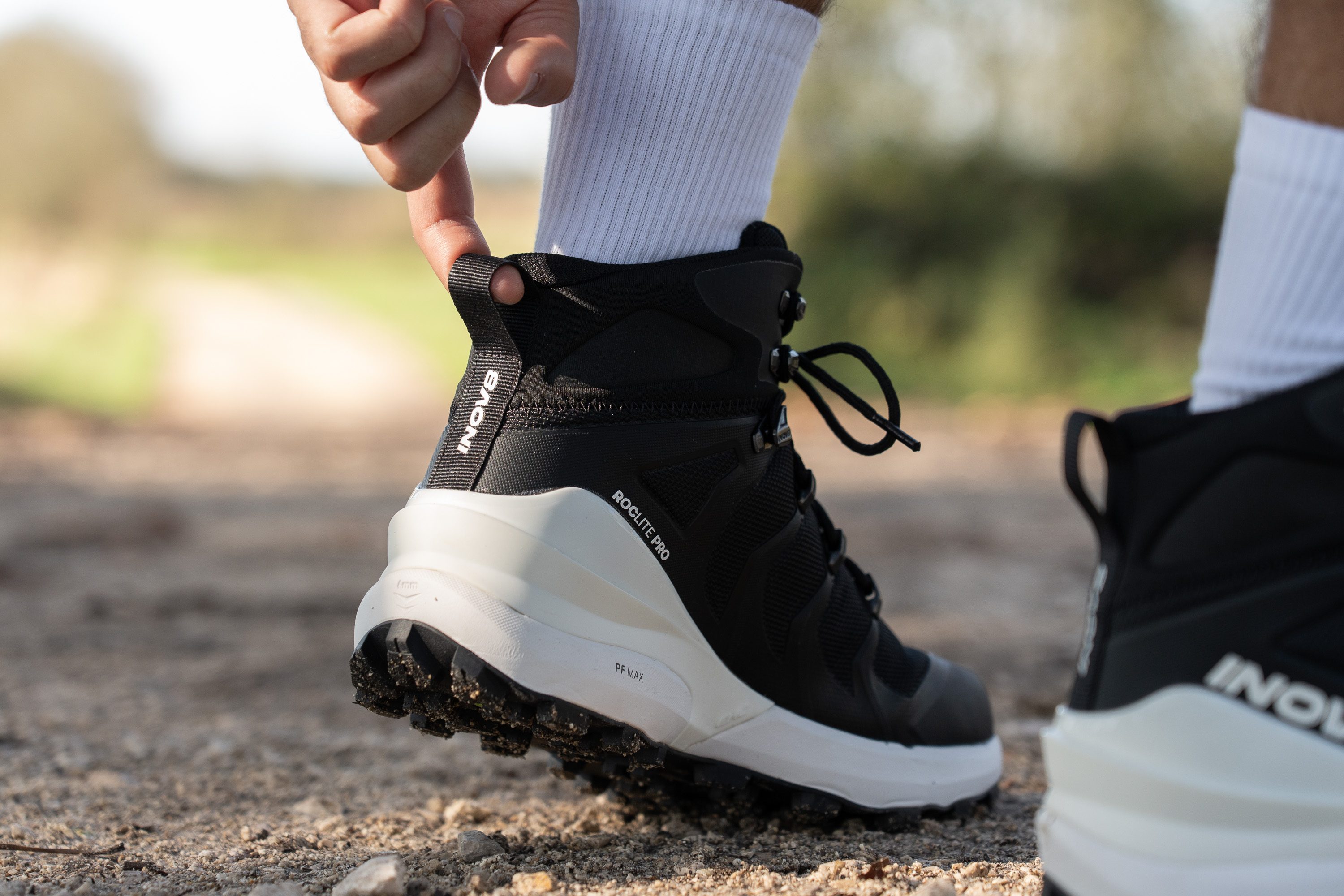
| Roclite Pro Mid GTX | Finger loop |
Price
With an average MSRP of $250, a technical backpacking boot is never a cheap purchase. That's why we were elated to see that the Inov8 Roclite Pro Mid GTX is offered slightly below the average.
Its high-class stability, grip, and comfort make this boot an excellent value for money.
| Roclite Pro Mid GTX | $230 |
| Average | $210 |

